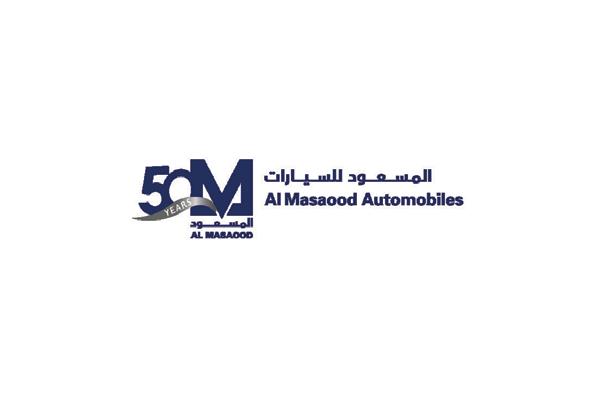A peoples’ business
Ali bin Towaih Al Suwaidi
Growth of eCommerce in MENA, Nicolas Bruylants
Thoughts on purpose, John Pearson





A peoples’ business
Ali bin Towaih Al Suwaidi
Growth of eCommerce in MENA, Nicolas Bruylants
Thoughts on purpose, John Pearson




who’ve led their teams to greater heights and have thrived in the face of the challenges brought about by the pandemic

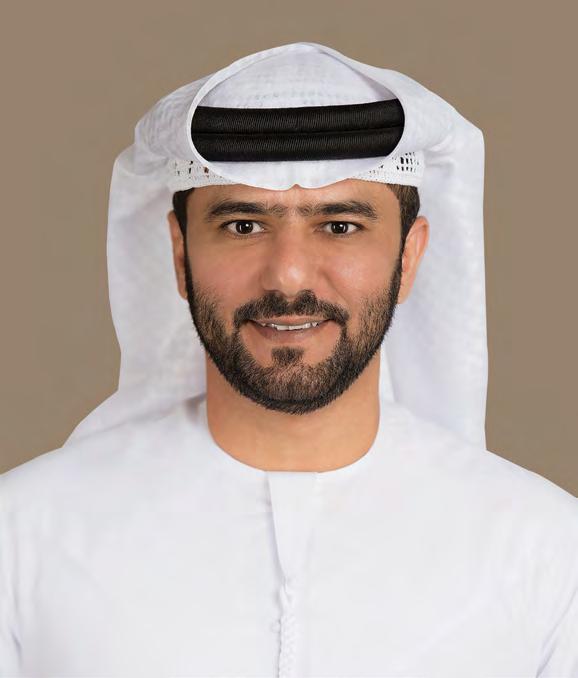
We showcase the top 25 logistics leaders from the region who’ve led their teams to greater heights and have thrived in the face of the challenges brought about by the pandemic

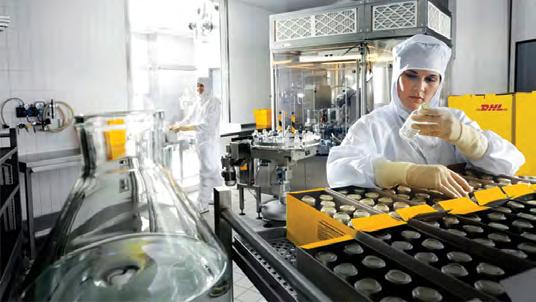
14 INTERVIEW
A PEOPLES’ BUSINESS
The Ajman Free Zone (AFZ) has become a leading choice for businesses as it offers not only world-class infrastructure but also a business-friendly environment.
18 E-COMMERCE
A BITE OF THE ECOMMERCE MARKET
Dubai’s food producers see a lucrative appeal is taking their business online as more and more consumers head to the digital space to purchase goods and services.
20 E-COMMERCE GROWTH OF ECOMMERCE IN MENA
Nicolas Bruylants, co-founder and CVO of CNNB Solutions, tells us how direct-to-consumer (DTC)
eCommerce channels, which are marketing and sales directly from brand websites to end customers, will accelerate eCommerce across the MENA region over the coming years.
48 OP-ED THOUGHTS ON PURPOSE
John Pearson, Chief Executive Officer at DHL Worldwide Express, writes how the pandemic brought the best out of DHL Express.
50 TECH SOLUTIONS MEETING DEMANDS
Lyve’s new cross border delivery service is gaining steam in the UAE’s eCommerce sector as it allows smaller businesses to deliver their products to customers in Saudi Arabia seamlessly.

The logistics industry like every other sector was affected by the pandemic, but slowly it has turned its challenges into opportunities and has thrived in the face of adversity. In this issue we bring to you the top 25 honchos from the logistics and supply chain sector who’ve steered their organisations to greater heights amidst the chaos.
The pandemic accelerated digitisation in the logistics industry, with companies swiftly adapting to new and innovative means. Etihad Cargo recently partnered with CargoAi, the SaaS application which
provides air cargo digital solutions, to elevate the carrier’s API accessibility for freight forwarders as part of its digitalisation strategy. Earlier in the year it tied up with WiseTech Global Limited to advance its international digital booking reach.
Similarly, dnata partnered with Kale Logistics Solutions to develop a nextgeneration eCommerce platform for the cargo community in the UAE.
Smaller logistics companies are also focusing on digitisation to enhance their offerings. Premier Logistics, for example, was founded to focus primarily on digitisation of the age-old industry of logistics within the Middle East.
Trukker, a digital platform for trucking services, attributes most of its success to technology innovation and smooth onground operations, which it claims are responsible for introducing reliability, transparency, and convenience to the monolithic freight world.
This new shift is going to elevate the logistics industry and increase transparency, accelerate delivery processes, and streamline bookings to provide additional convenience. Let’s wait and watch how technology further revolutionises this industry.
Jochebed Menon
CEO Wissam Younane wissam@bncpublishing.net
DIRECTOR Rabih Najm rabih@bncpublishing.net
GROUP PUBLISHING DIRECTOR
Joaquim D'Costa jo@bncpublishing.net +971 50 440 2706
BUSINESS DEVELOPMENT DIRECTOR
Rabih Naderi rabih.naderi@bncpublishing.net +966 50 328 9818
MANAGING EDITOR Kasun Illankoon kasun@bncpublishing.net
EDITOR Jochebed Menon
EDITORIAL DESIGN Christian Harb
MARKETING EXECUTIVE
Aaron Joshua Sinanbam aj@bncpublishing.net
PHOTOGRAPHER
Alexander Bungas
Editor, Logistics News Middle East jochebed@bncpublishing.net SUBSCRIBE
subscriptions@bncpublishing.net



For all commercial enquiries, contact sales@bncpublishing.net T +971 50 440 2706 PO Box 502511 Dubai, United Arab Emirates P +971 4 4200 506 | F +971 4 4200 196
All rights reserved © 2021.
Opinions expressed are solely those of the contributors.
Logistics News ME and all subsidiary publications in the MENA region are officially licensed exclusively to BNC Publishing in the MENA region by Logistics News ME.
No part of this magazine may be reproduced or transmitted in any form or by any means without written permission of the publisher.
Images used in Logistics News ME are credited when necessary. Attributed use of copyrighted images with permission. All images not credited courtesy Shutterstock.
Printed by UPP
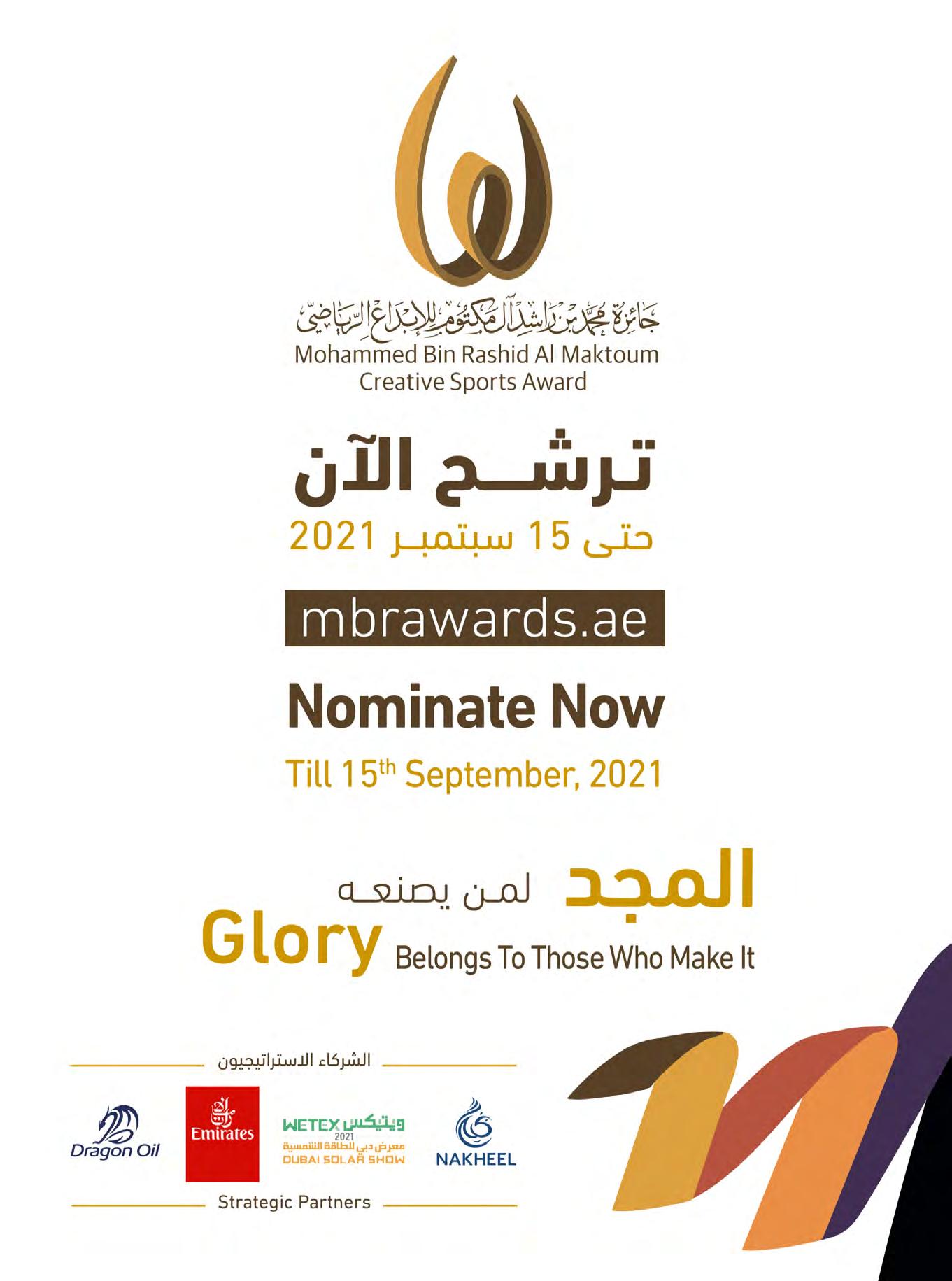



The founding shareholders of Red Sea Gateway Terminal Limited (RSGT) have officially completed their 40% RSGT equity sale to the Public Investment Fund (PIF) and COSCO Shipping Ports Limited (CSPL) (20% each).
The transactions imply an enterprise value for RSGT of USD880 million and a total gross inflow of equity value for the founding shareholders USD280 million. The founding shareholders will reduce their combined shareholding to 60%.
PIF is the economic engine of Vision 2030, driving the diversification of Saudi Arabia’s economy. The investment in RSGT is in line with PIF’s 2021-2025 strategy that focuses on 13 key priority sectors, including Transport and Logistics.
The location is on the main EastWest trade routes, with proximity to the main cargo end destinations on the West Coast of Saudi Arabia and captures significant intra-Red Sea
trans-shipment cargo volumes.
The investment will help to transform RSGT into both a regional and global logistics hub in line with PIF’s mission of unlocking new economic opportunities locally and globally. RSGT will benefit and enhance its value proposition with the support of and a leading global ports operator like CSPL, which they will bring new momentum to the growth of RSGT’s business volume. Both new shareholders will help drive future growth on seaside and landside logistics.
Jens O. Floe, CEO of RSGT, said, “This is a significant milestone for RSGT, demonstrating both our strength and the confidence which the industry and investment community have in our strategic planning and implementation
“Working closely with PIF and CSPL, we will accelerate our shared vision, further strengthen our customer offering, and elevate our mandate to meet the increasing demand for terminal and logistics services. RSGT
will continue to focus on developing a niche emerging market operator with a keen focus on ports in the Red Sea and East Africa.”
Having commenced operation in 2009, RSGT is located at the worldclass Jeddah Islamic Port, a crucial logistics hub serving as a global trade nexus linking Asia, Europe, and Africa, as well as an increasingly important regional business centre.
RSGT will remain an independent terminal operator, servicing its customers across the global logistics chain. It will also continue to focus on the development, construction, operation, and maintenance of port terminals and on logistics services.
“Moving forward, a key element of RSGT’s ongoing development plan, beyond domestic and targeted international expansion, is to further develop our modern port and supply chain facilities enabling us to better meet the needs of our global and local customers,” Jens added.
Proven Consult, a GCCbased automation technology firm, announced the signing of a Memorandum of Understanding (MoU) with United Warehouse Co Ltd (UWC), a warehousing logistics service provider in Saudi Arabia, to help accelerate digital transformation in the logistics industry.
Under the terms of agreement signed on 1 July, both companies will collaborate in advancing technological transformation through the deployment of latest technologies.
Committed to creating smarter businesses with its team of experts, Proven Consult, in partnership with UWC, will work to create value through implementation of digital technologies.
“At Proven Consult, innovation is at the heart of everything we do. Our
goal is to support businesses prepare for a digital future and change the way they conduct operations. We are extremely pleased to be the technology vendors of choice for UWC and look forward to our collaboration.
“We believe this partnership will mark the beginning of a longstanding business association as we embark on the journey of digital transformation for UWC,” said Anas Abdul-Haiy, CEO and Deputy Director at Proven Consult.
The company aims to enhance business performance and implement Intelligent Business Automation as a core functional area within UWC to further enable technological efficiencies and achieve uniformity, integrate digitisation, and improve functionality across various verticals within the organization.
This joint venture between two industry pioneers aims to realise Saudi Vision 2030 with the combined goal of promoting technological advancement in the Kingdom, while at the same time placing Saudi Arabia on the world map in terms of technological advancement.
“In the changing landscape of work, it is important for organizations to accelerate digital transformation and work through collaboration with external partners,” commented Fathi Abdullah Ba-Isa, Managing Director of UWC.
“With the signing of this MoU, we hope to strengthen our ecosystems and drive digital transformation for our clients, bringing them value through the implementation of latest technologies.”
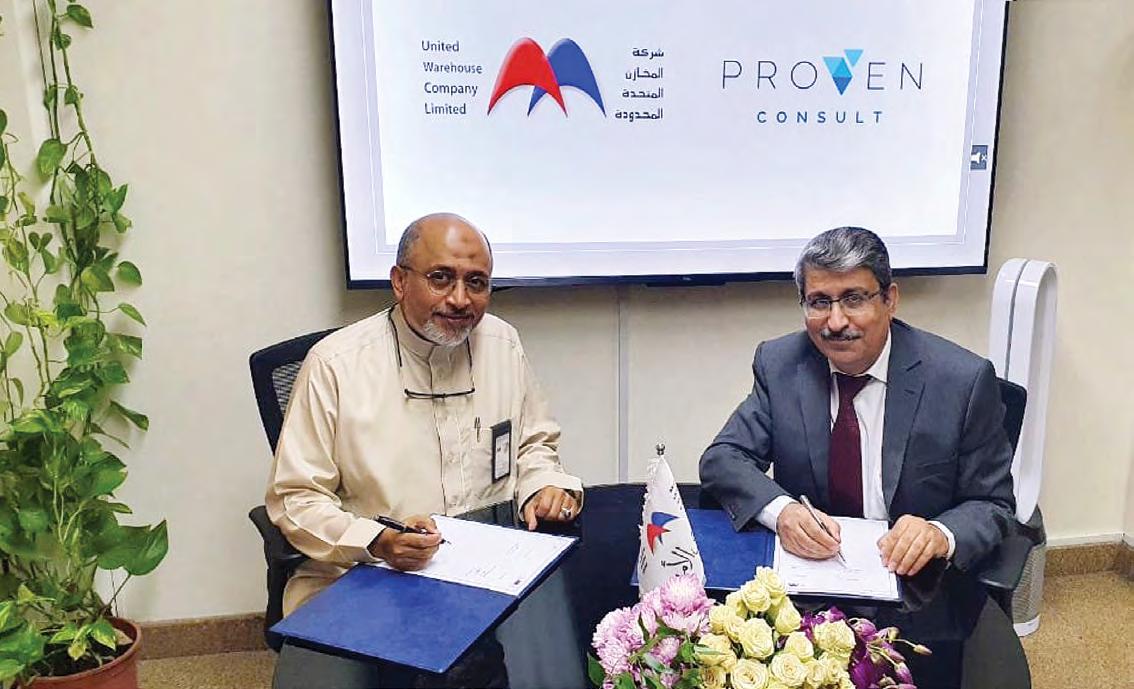

DP World seeks to acquire Johannesburg Stock Exchange-listed Imperial Logistics, an integrated logistics and market access company with operations mainly across the African continent and in Europe.
The acquisition will enhance DP World’s capabilities, particularly in Africa, building on its extensive infrastructure of ports, terminals, and economic zones.
It will also significantly accelerate DP World’s transformation into an advanced logistics company offering end to end supply chain services to the owners of cargo.
DP World’s cash offer of ZAR66 per share implies an equity consideration of around ZAR 12.7bn (around USD890mn).
It represents a premium of 39.5% to the Imperial share price as of 7 July 2021 on the Johannesburg Stock Exchange (JSE) and a 34.2% premium to the 30-day volume weighted average price.
This transaction is subject to Imperial’s shareholder approval and other customary completion conditions including regulatory approvals.
Imperial is a South African integrated logistics and market access solutions provider with a presence across 25 countries, including a significant footprint in the high growth Africa market.
The group focuses on fast-growing industries including healthcare, consumer, automotive, chemicals, industrial and commodities.
Imperial’s business has been built on long-term partnerships with cargo owners, in addition to serving as a trusted partner to many multinational clients, principals and customers.
The acquisition of Imperial will add new capabilities to DP World, particularly in Africa. Combining the companies will create the continent’s best network across inland logistics, ports & terminals, economic zones, and marine logistics.
DP World aims to improve connectivity between African producers along fast-growing trade lanes to the rest of the world.
Sultan Ahmed Bin Sulayem, Group Chairman and CEO, DP World, said: “The acquisition of Imperial will help DP World to build better and more efficient supply chains for the owners of cargo, especially in Africa. Imperial’s operations are complementary to our network of ports, terminals, and logistics operations on the continent.
“Like DP World, Imperial’s biggest asset is its people, and we look forward to welcoming employees of Imperial into the DP World team on successful conclusion of the transaction.”
The acquisition will also build on Imperial’s contribution to the South African economy. Integration with DP World will strengthen South Africa’s position as a logistics hub for Africa.
DP World is keenly aware of the importance of economic transformation through Broad-Based Black Economic Empowerment (B-BBEE) and intends to maintain Imperial’s existing programmes, and fully supports Imperial’s proposed B-BBEE transaction that was announced in April 2021.
Mohammed Akoojee, Group Chief Executive Officer of Imperial Logistics said: “This transaction will be value-enhancing for Imperial as the business will benefit from DP World’s leading technology, global networks and key trade lane volumes, while enabling us to build on our ‘Gateway to Africa’ strategic and growth ambitions.
“Combining DP World’s world-class infrastructure such as its investment and expertise in ports on the African continent, with Imperial’s logistics and market access platforms will enable us to offer integrated end-toend solutions along key trade lanes into and out of Africa, also driving greater supply chain efficiencies, and ultimately enhancing value for all stakeholders.”
The deal will be funded from DP World’s existing available resources. DP World continues to make positive progress on its capital recycling programmes and remains fully committed to its leverage target of net debt being below four times EBITDA by the end of 2022.
Maersk is redesigning its ocean network in West & Central Asia that connects countries including India, Bangladesh, Sri Lanka, Pakistan, UAE, and Saudi Arabia to the world.
The changes in network are primarily aimed at improving speed to market, providing higher predictability, and offering more flexibility to customers’ supply chains.
Further, redesigning the network will also bring more resilience to the customers’ supply chains, protecting them better from operational challenges that arise out of contingencies.
“Since the beginning of COVID-19, supply chains have experienced a perfect storm. The unprecedented scale of operational challenges restricting supply during the pandemic and the strong demand surge in parallel led to significant bottlenecks, capacity issues and unforeseen delays across supply chains.
“This prompted us to redesign our ocean network to overcome these challenges and make our customers’ supply chains more

resilient,” said Mads Skov-Hansen, Head of Liner Operations Cluster, Maersk West & Central Asia.
The new ME4 service will offer a direct coverage between Doha and North Europe, thus improving speed to market by up to 5 days and by up to 6 days from Jebel Ali to West Africa for majority of customers.
The ME3 service connecting fresh produce exporters from Pakistan to Russia will see an improvement in what ‘best-in-industry’ transit times are already. This will further reduce wastage of the fresh produce by maintaining its integrity through end-to-end cold chain logistics offered by Maersk in Pakistan.
The FI3 service will change from fortnightly to weekly giving frequent options for importers getting cargo from Far East into North India.
The ME7 service will connect South India’s lifestyle, retail, and automotive manufacturing sector directly to Europe. The cargo will thus flow smoothly without getting affected by unforeseen delays in case of congestions.
The ME7 service will also provide a direct and regular rotation between the hubs of Colombo and Salalah, thus letting customers
have a more flexible option of moving their cargo.
The new FI4 service, that combines previous Jade Express and Chennai Express, will connect Southeast Asia with India and Pakistan on a single direct service.
“Our customers deserve a predictable service that will allow them to plan their supply chains better. With our redesigned ocean network, we are not only providing our customers with predictability and resilience, but also greater speed to market allowing them to optimise their inventories and operations to meet the surge in demand with a competitive edge,” commented Bhavan Vempati, Regional Head of Ocean Management, Maersk West & Central Asia.
As a part of redesigning of the network, the ME6 service as well as transhipment on AE1 at Colombo will be discontinued. Customers will continue to have the options to connect their cargo on a full array of services calling West & Central Asia.
The network changes will be implemented in a phased manner and will not affect the total deployed capacity in the global network.

Sohar Port and Freezone, in collaboration with the Federation of Indian Chambers of Commerce & Industry (FICCI), has launched a series of five online webinars to explore opportunities between Sohar and the Indian market.
In the following months, four more webinars will be conducted targeting the various key industries such as food, automotive, plastics and metals.
The first, ‘Accessing Industrial and Logistic Solutions to Maximise Your Market Reach’ included presentations from Sohar Port and Freezone’s Deputy Chief Executive Officer (DCEO) and Sohar Freezone CEO, Omar Al Mahrizi, on Sohar’s strategic advantages, and its Free Trade Agreement (FTA) Advisor, Emmee Haun, on how to utilise Sohar to access the US market.
Speakers included established investors such as Sameer Gupta from Jindal Shadeed and Malvika Khimji from Khimji Ramdas highlighted their own success stories.
Omar Al Mahrizi said: “Oman and India have enjoyed decades of bilateral trading, linked by history, culture and warm and cordial relations. As a well-connected integrated hub with established clusters, our close geographical location, coupled with prime waterfront access, leasable land options and excellent infrastructure are all key ingredients to provide Indian investors with unique business opportunities.
“This webinar series provides the ideal platform for us to highlight these prospects to FICCI’s vast network, paving the way for future business development and closer relations.”
An inspiring 70 Indian businesses took part in the first session, which focused on promoting access to Sohar Port and Freezone’s strategic advantages and location to maximise market reach between India, the GCC, Africa and the US. The
agenda for forthcoming webinars will be released prior to each event.
The series of webinars will provide unrivalled insight into the opportunities available to participating companies for producing or adding value to their products by partnering with Sohar.
Through the competitive utility prices, attractive incentive packages, and rich source of raw materials offered by the Port and Freezone, in addition to the benefit of the Oman-US Free Trade Agreement for duty free access on qualifying products. There is huge potential for expanding mutually beneficial commercial partnerships between Indian and Omani enterprises.
Sohar Port and Freezone is already home to several prominent Indian investors including Jindal, Larsen and Toubro (L&T), and Moon Iron and Steel Company (MISCO) and with several new infrastructure projects and investments underway, there is ample room for growth. Meanwhile, it is also heavily invested in innovative sustainability practices and projects, with an emphasis on renewable energy, one of India’s fastest growing sectors.
Businesses keen to set up at SOHAR can benefit from a myriad of incentives, easy set-up facilities and take advantage of the company’s global outreach across Africa, Asia and the Middle East markets.
Sohar Port & Freezone recently released its Q1 2021 results noting growth in all categories of cargo compared to the same period the previous year. Throughput increased by 21% over the same period in 2020, dry bulk volume grew by 23.6% to almost 9 million tonnes, breakbulk handling grew by 6.8% to 426,783 and liquid bulk increased by 7% to just over 4 million tonnes.
In addition, the number of containers handled rose by 1.9% to 1.9 million and the total vessels visiting the port rose by 13.7% to 843 vessels as the Port continues to expand operations.
Saudi Arabia’s LogiPoint has awarded a contract for construction of its Warehouse Village V, its state-of-the-art, multi-purpose warehousing complex to Sahara Building Contractors.
Warehousing Village V will be built in one of LogiPoint’s flagship Logistics Park – the Bonded and Re-Export Zones at Jeddah Islamic Port. Construction is expected to star in August 2021 and the project will be ready for hand-over in July 2022.
LogiPoint, an international logistics real estate company, has grown to become the Kingdom’s premier developer and operator of transformative logistics parks and zones.
The Bonded and Re-Export Zone is a 1,000,000 sqm fully integrated logistics platform dedicated to facilitating trade and development in the Kingdom by enabling the supply chain and logistics industry and by creating value through investments in innovative, next generation solutions and state-of-the-art logistics infrastructure.
Currently, LogiPoint warehousing facilities are operating at over 100% utilisation and hence Village V is a welcome addition.
The new facility will be built over a 24,500 sqm area with dedicated zones for handling frozen, chilled, ambient, and dry cargo. Warehousing Village V also introduces a LogiPoint first with a
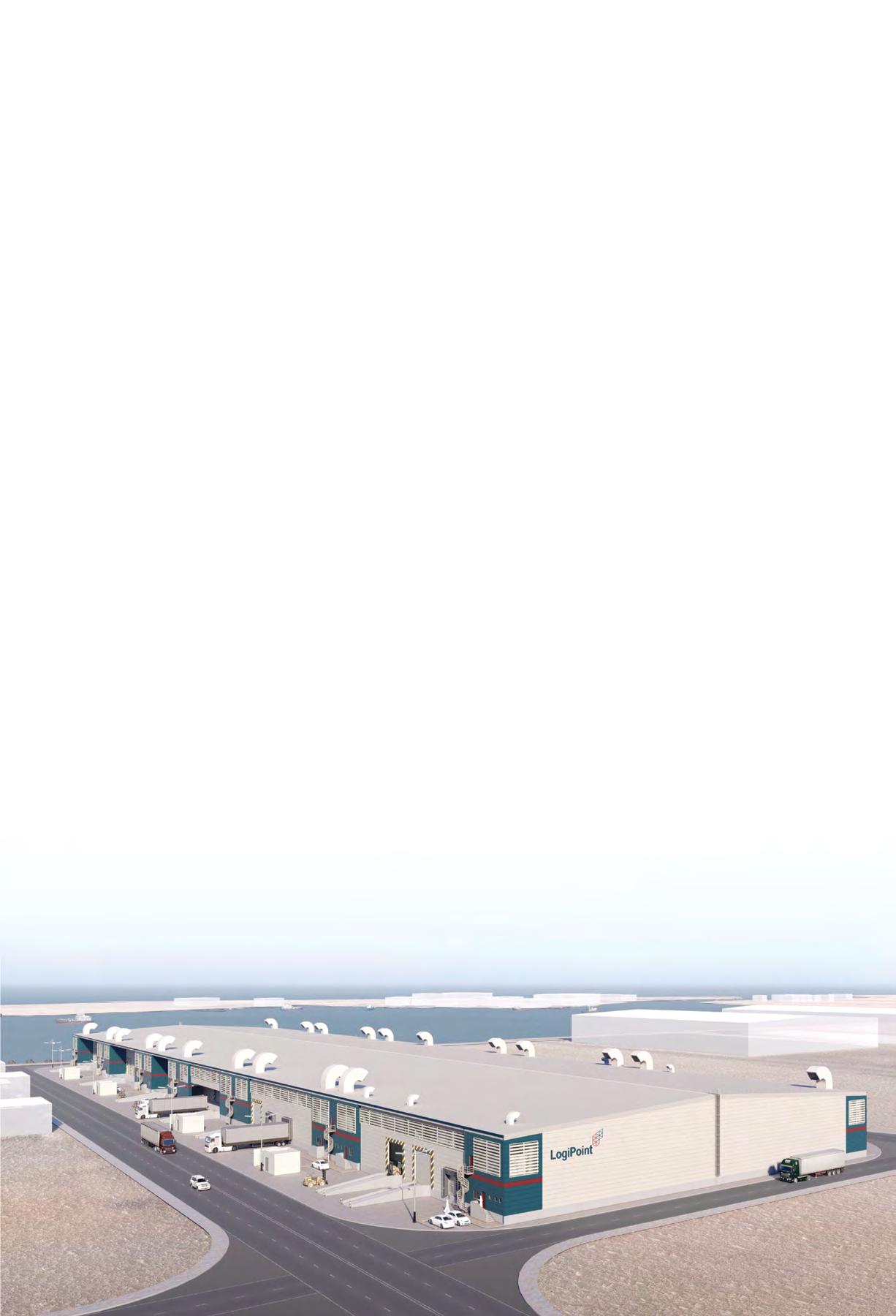
dedicated zone designed and equipped to handle pharmaceutical goods inside Jeddah Islamic Port.
Additionally, the value addition zone will enable LogiPoint to extend their time tested and much in demand value added services to their clients allowing them to act as a truly transformative logistics hub for the region.
Farooq Shaikh, the CEO of LogiPoint, believes that the company’s mission of enabling logistics and facilitating trade and economic growth by acting as a stakeholder in the Kingdom’s growth has become more pertinent than ever before.
He believes that LogiPoint’s investments into infrastructure projects carry a multiplier effect for the Kingdom’s economy because of the multiple new investments these projects attract to the Kingdom. He says: “Village V is going to be our most sophisticated addition yet to LogiPoint’s warehousing infrastructure inside Jeddah Islamic Port. The importance and relevance of a facility that is designed to receive, handle, store and distribute pharmaceutical goods can scarcely be overstated today.
“At the same time, the addition of a multi-purpose advanced warehousing facility at LogiPoint BRZ reinforces Jeddah as an integrated logistics hub internationally and demonstrates just how well we are aligned with the Vision 2030’s goal to make the Kingdom a regional logistics hub of choice. Village V is start
of the expansion plans that is expected to increase LogiPoint BRZ’s warehousing capacity by about 150% during next 2-3 years.”
Warehousing Village V has been designed by Jamjoom Consulting in line with international logistics infrastructure specifications and incorporates the latest green building technologies to ensure compliance with environmental standards.
The facility will rely on renewable resources for power generation and has been designed to conserve energy through eliminating waste and using low consumption LED lighting system.
LogiPoint clients at Warehousing Village V will experience enhanced speed and agility in their logistics operations because of innovative and intuitive design to allow seamless processes as well as the use of latest docking equipment including docklevellers with integrated dock shelters.
LogiPoint promises constant care to clients through adherence to stringent LogiPoint QHSSE policies as well as through providing cutting edge technological support ensured via an Integrated IT System, 24/7 CCTV, and modern Fire and Safety Systems.
This facility promises to be a great addition to the Jeddah Islamic Port Logistics infrastructure and will further strengthen Jeddah’s credentials as an international logistics hub equipped to serve the full spectrum of logistics and supply chain clients.
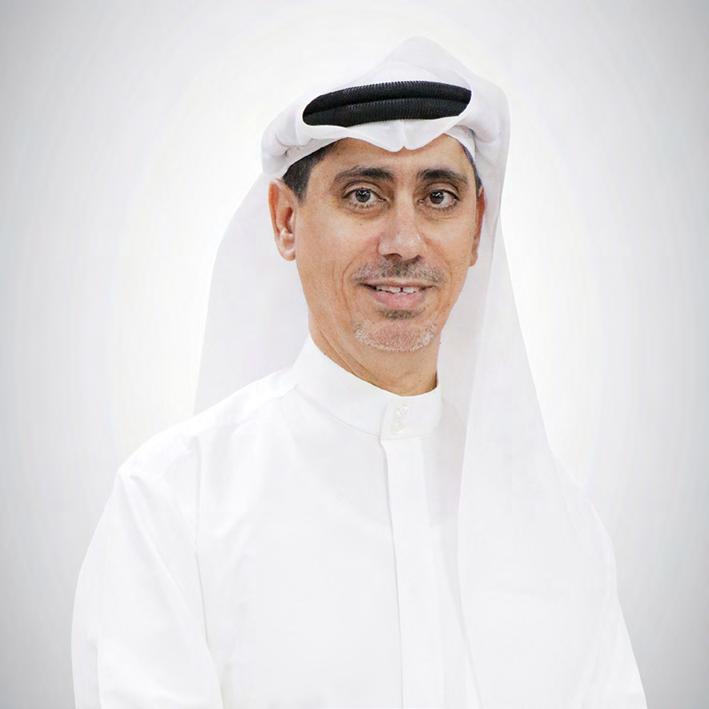
THE AJMAN FREE ZONE (AFZ) has become a leading choice for businesses as it offers not only world-class infrastructure but also a business-friendly environment. ENG ALI BIN TOWAIH AL SUWAIDI, DIRECTOR GENERAL tells us more.
It’s been a little over a year since Al Suwaidi took over and the free zone has witnessed a tremendous growth. In the first quarter of the year 492 new companies registered in the free zone compared to 269 in 2020.
Al Suwaidi has been instrumental in fostering a business-friendly environment for investors that stems from building personal relationships, safety, security,
and accelerating the pace of smart transformation.
He believes that Ajman Free Zones plays a vital role in the progress of the UAE economy. “I joined in May 2020 and when I took on the responsibilities here, I realised how important AFZ is, not just to the Ajman Government or to the economy in the emirate but is crucial to the success of the UAE and the industries in the region,” he says.
He adds: “By realising its importance, we need to also value our presence and how we can add value to the industry and economy. We need to learn to progress further. I joined during an incredibly challenging period because the whole world was under a lockdown, but that gave me an opportunity to understand the business, the culture here, business partners, type of industries and the challenges they face. I took my time building up the trust both internally and externally.”
Al Suwaidi takes special interest in getting to know the companies in the free zone, understanding their businesses and providing solutions to any challenges that come up.
“I take personal interest in each business coming in. I try to meet and welcome them here and get to know more about their operations. I have learned so much in the few months that I’ve been here. I see opportunity everywhere and my aim is to support each business here to the best that we can,” he states.
“While infrastructure and world-class facility offerings are great, what’s of greater importance is the solutions we provide to our partners. I believe in developing a relationship with our investors and that is a game changer. The service we provide, the solutions offered, and assistance granted is what makes us a preferred free zone. This gives investors great confidence in us as they realise how we value them. We offer tailor-made solutions and take time to understand what their businesses are about so we can do our best to support them.”
Ajman Free Zone also bets on its modern infrastructure that supports its aspirations to become a leading choice for businesses all over the world. “The infrastructure we have is great and quite accommodating to the needs of different industries. Not just the warehouses, but office spaces and a range of facilities available encompassing the latest technology,” he reveals.
Much of this infrastructure is sustainable and is serving businesses that are committed to sustainable development. A 9,000 sqm green zone using eco-friendly methods has been introduced.
This green zone is equipped with the right technologies to limit waste, reduce energy costs, and improve efficiency, and can help companies save money while meeting their environmental sustainability goals.
AFZ is looking also to reduce water consumption and the warehouses have effective waste management solutions, dedicated loading, vehicle parking, e-charging stations powered by solar energy, and readily available pantry.
Security is another aspect that AFZ is focusing on. He notes: “We have more than 1,000 surveillance cameras around our facilities. Entry and exits are strictly monitored. It is a very safe environment. Investors and business owners can be rest assured that their employees, their premises, and operations are secure here.”
A strategic security and safety partnership was signed with BrakeFire to ensure security, safety, and wellbeing of its business community.
“WE’RE SEGREGATING BUSINESSES BASED ON THEIR TYPE OF OPERATIONS AND ONCE COMPLETE IT WILL ALLOW US TO BE A BIGGER SUCCESS.”
The partnership will help AFZ to offer a new set of business support services according to distinct industry standards. It seeks to improve the efficiency and effectiveness of safety practices within the free zone, as well as lessen accidents, personal injuries, and property damage for a safer and more sustainable, flexible, and productive business environment.
Furthermore, under Al Suwaidi’s able leadership AFZ is providing its investors with value added services such as banking and healthcare services.
In July, AFZ partnered with Abu Dhabi National Insurance Co. (ADNIC) to provide health insurance policies to
investors and entities. Following which, a collaboration with Ajman Specialty General Hospital was announced to offer additional healthcare benefits to employees and investors. The partnership will allow AFZ staff and clients, together with their personnel and immediate family, to avail discount on their medical bills while receiving premium healthcare services from the hospital.
Al Suwaidi says: “This partnership reflects our initiative to strengthen our support to our business partners. On our part, we are continuing to provide various value-added services to help investors focus on their business and accomplish their desired goals.” >>>

To help business operators, especially SMEs, AFZ tied up with RAKBANK to facilitate easy access to account opening services, loans, credit facilities, and other banking solutions. Earlier in the year it partnered with Mashreq Banks to offer similar services.
Al Suwaidi is leaving no stone unturned to boost investment activities in the free zone. In May it launched Mashoura an initiative that leverages the expertise and experiences of leading Emirati businessmen to support entrepreneurs.
The initiative establishes new linkages and opportunities to network for entrepreneurs within the Ajman business community, which can lead to new projects and strategic partnerships.
Logistics is an important facet of AFZ, and Al Suwaidi takes great pride in the logistics support provided to business partners. “We have a number of factories and manufacturing businesses operating here so transportation is the most obvious challenge and the highest cost in their operations.
“To ease this, we have connected with several land transport partners and created strong links with Ajman Port Authori-
ties, JAFZA, KIZAD, Khalifa Port. These links are helping our business partners with import and export. We also have good relationships with all the airports in the country,” he says.
AFZ has tied up with several training and educational institutes in Ajman to provide its logistics and supply chain firms certification courses for their employees. These trainings cover relevant information related to the logistics sector.
As part of Al Suwaidi’s plans to improve investment opportunities into the free zone and ease business operations, AFZ is working creating different business clusters. “We’re segregating businesses based on their type of operations and once complete it will allow us to be a bigger success,” he reveals.
AFZ is also focusing on ensuring regulations are followed – not just local but global too. “The flexibility to work around these regulations is going to allow us to attract new companies. We have a huge number of licenses available, and these numbers are scattered. One of our focus is to segregate them into business groups and work with them and be a part of their development. We are working on trying to be true partner and how we can support them, not just here but outside
the free zone because their success is our success,” Al Suwaidi says.
Al Suwaidi has one vision for AFZ – to be a leading choice in the region. “I envision AFZ to strengthen its presence in the market and to be one of the leading free zones in the region in the next five years.
“The UAE is a global country now and anything we do there has a significance across the world, not just in the region. This is thanks to the vision of our leaders whom we are incredibly grateful to for putting the country on the global map. Our achievements as a country are enormous.”
He adds: “As AFZ, we need to strengthen that position by having a world class business environment and employees who are equipped for the opportunities it provides. So, the challenges have given us enormous opportunities to capture business.”
“Based on that there have been many decisions taken and many processes put in place. We’re working on towards one goal and that is to portray Ajman Free Zone as a valuable partner to businesses out there who are looking for a solution.”

“AS AFZ, WE NEED TO STRENGTHEN THAT POSITION BY HAVING A WORLD CLASS BUSINESS ENVIRONMENT AND EMPLOYEES WHO ARE EQUIPPED FOR THE OPPORTUNITIES IT PROVIDES.”

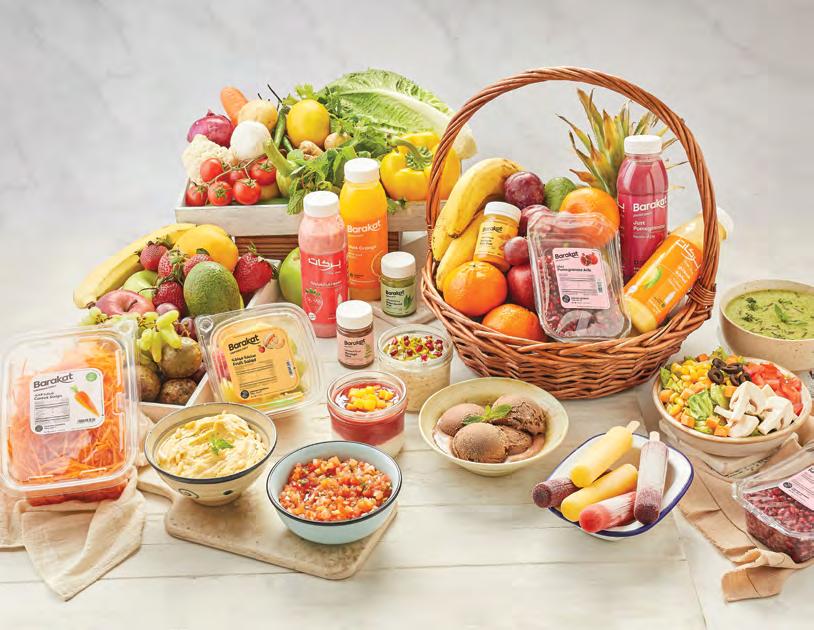
Dubai’s food producers see a lucrative appeal is taking their business online as more and more consumers head to the digital space to purchase goods and services
Aparadigm shift in food manufacturing is under way, as local producers bolt-on eCommerce platforms to capitalise on a booming market to offer consumers everything from dates to baked goods at wholesale prices.
It comes against the backdrop of an invisible virus that caused havoc to global supply chains and sent online sales skyrocketing as shoppers moved online to make daily purchases. For many companies that experienced forced closure of customer-facing branches, such as nonessential shops and restaurants, eCommerce was the only way to ensure their survival during the pandemic.
Last year, over two billion people across the globe purchased goods or services online, and the total value of eRetail sales surpassed USD4.2 trillion.
Moreover, a third of UAE consumers have been shopping online more frequently following the outbreak of COVID-19.
Product categories that reported the greatest surge in purchases initially included health supplies, especially personal protective equipment, as well as electronics required for remote working and home entertainment. As the pandemic wore on, food and beverages, alongside home improvement goods and personal care products saw boosted online sales.
In a bid to strengthen their offerings and expand their reach in the UAE market, local food producers based in Dubai Industrial City, one of the largest industrial hubs in the region, have realised the benefits of going digital.
Dofreeze, a packaged bakery snack company that exports products to over 50 countries, rolled out its eCommerce site in April 2020. But it was not until September that the brand saw an increase in sales.
Following healthy demand, the company plans to expand its offering with a wider product selection and greater visibility. It does, however, admit to facing “a challenge” in finding a third-party logistics delivery service that covers all areas.
“We have always tried to set a high standard when it comes to innovation in the baked snack market and introducing an easier way for customers to buy our products seemed like an obvious way to do that,” says Aamer Fayyaz, CEO at Dofreeze.
“Whether it is cookies, brownies, or everything in-between, providing a wide range of delicious bakery goods at competitive prices with more convenience is extremely important to us. We’re delighted to have made many of our delicious treats available online and look forward to expanding our range in the coming months as more regional consumers embrace eCommerce.”
Meanwhile, Barakat, a local market leader in fresh juices and pre-packaged fruits and vegetables, whose newly redesigned packaging is a staple on the shelves of every reputable supermarket in the UAE, witnessed a much more pronounced impact on its bottom line.
A stalwart of the regional market since its inception in 1976, the company launched its e-commerce platform www. barakatfresh.ae in April 2018 and added an app on iOS and Android in August 2020 to enhance convenience for mobile users.
In 2020, after the pandemic struck, the brand saw its business quadruple compared to the previous year, and the momentum continues to date.
Under the tagline ‘Best of Fresh’, Barakat stocks more than 800 varieties of fruits and vegetables from around the world,
“ECOMMERCE HAS THE POTENTIAL TO TAKE COMPANIES TO THE NEXT LEVEL. BUT THIS REQUIRES SOLID INFRASTRUCTURE.”
in addition to fresh products, such as juices, immunityboosting shots, cut vegetables, fruit platters and baskets.
The company is building its portfolio in line with its global demand for healthy eating. And to cater to the proliferation of home chefs, the brand has launched a range of fresh ready-to-cook solutions and cooking ingredients.
eCommerce has been a significant growth driver for the manufacturing business as well. Barakat owns and operates an end-to-end chilled supply chain, where the produce is maintained at perfect storage temperatures to retain freshness till the customer’s doorstep. The central warehouse serves the entire UAE, offering the company complete control over handling, quality, and hygiene.
Al Barakah Dates – which recently announced plans to establish the world’s largest privately-owned date factory – launched its eCommerce site in July 2020 in direct response to the changing shopping patterns of consumers. The move resulted in 20% growth
in total local sales during the pandemic.
“We sell our products by the carton on our website, similar to a factory outlet or a cashand-carry, where customers pay far lower prices when they buy in bulk,” explains Managing Director Yousuf Saleem.
“We’re currently selling online in the UAE only, and are now working to grow the model to reach international consumers, too.”
To support its ambitions, in March 2021, the company announced plans to expand its existing facility in Dubai Industrial City into the world’s biggest privately owned date factory. It will have the capacity to process over 100,000 tonnes of dates and date products annually – almost half of the UAE’s domestic harvest.
The 600,000 sq ft sustainable facility, powered by more than 6,500 solar panels, is scheduled for completion in early 2022.
“Food producers based in Dubai Industrial City play a key role in enhancing the UAE’s food security and
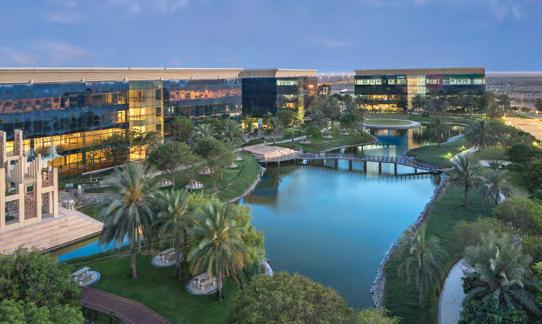
Saud Abu Al-Shawareb, Managing Director of Dubai Industrial
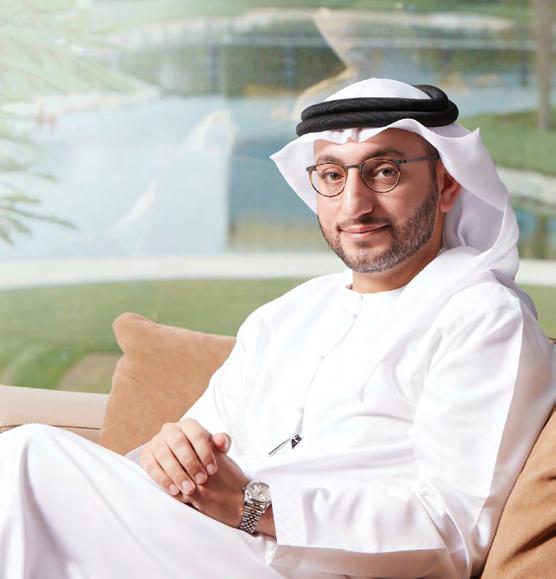
self-sufficiency – one of the priorities of our country’s post-pandemic recovery plans as we build a competitive knowledge and innovationbased economy,” says Saud Abu Al-Shawareb, Managing Director of Dubai Industrial City.
“Recent events have demonstrated the importance of robust and sustainable food supply chains, and pivoting to eCommerce, agile manufacturers have given consumers greater convenience and access to healthy goods at competitive prices.
“It’s great to see our partners adjust their operation model to expand into new high-growth sectors and our business district was designed to provide companies with the flexibility to expand and capitalise on the opportunities in eCommerce,” he adds.
Speaking on the advantages of having a presence in Dubai Industrial City, Rashid Mohamed Alabbar, Board Member of the Barakat
Group of Companies, says: “The proximity to the port facilitates clearance, which saves valuable time and avoids loss of quality in transit for fresh produce. Barakat delivers this freshness advantage to its customers through a robust supply chain specialized in handling fresh, built over 44 years of operations in the UAE.”
Meanwhile, Al Barakah Dates’ Saleem values the cooperation and support of the team at Dubai Industrial City and the proximity of the business district to Jebel Ali Port as well as easy access to all emirates.
“eCommerce has the potential to take companies to the next level. But this requires solid infrastructure. Our industrial ecosystem is ideally positioned to serve the specialised needs of key players in the food sector and support them in scaling up production and expanding their businesses,” concludes Abu Al-Shawareb.
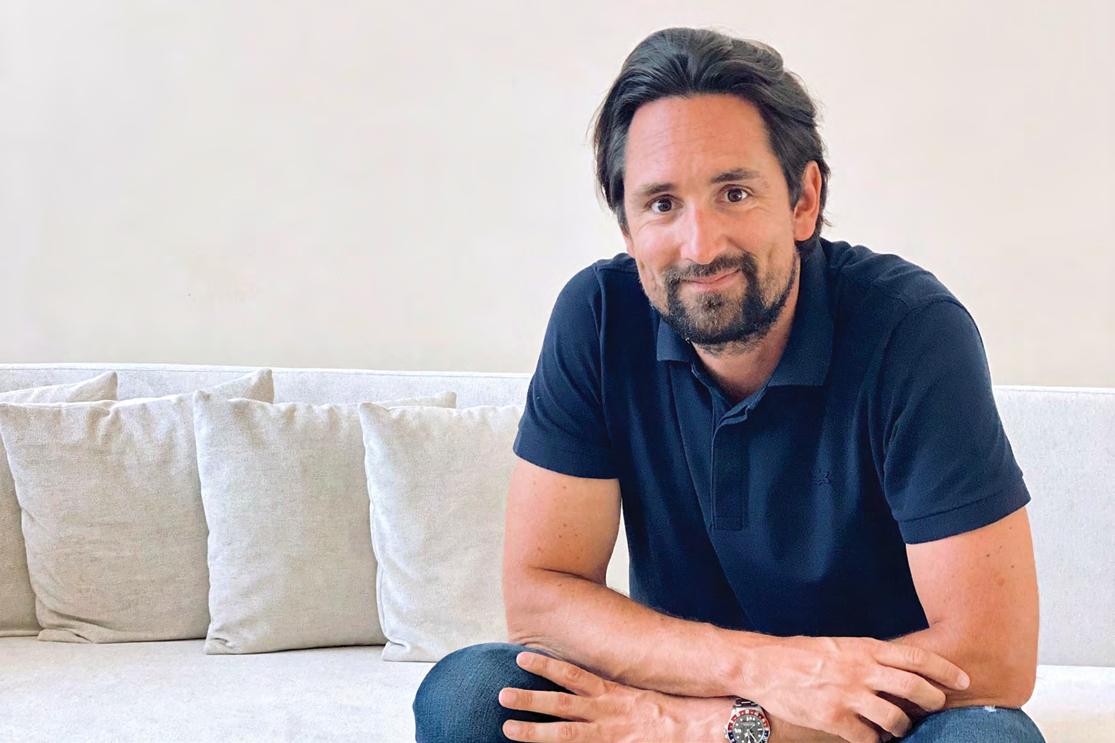
NICOLAS BRUYLANTS, CO-FOUNDER AND CVO OF CNNB SOLUTIONS, TELLS US HOW DIRECT-TO-CONSUMER (DTC) ECOMMERCE CHANNELS, WHICH ARE MARKETING AND SALES DIRECTLY FROM BRAND WEBSITES TO END CUSTOMERS, WILL ACCELERATE ECOMMERCE ACROSS THE MENA REGION OVER THE COMING YEARS
Estimates from Kearney Middle East suggest the Middle East and North Africa region’s eCommerce market could grow from USD21 billion today to USD50 billion by the end of 2025.
Two of the biggest eCommerce sectors in the region are beauty and fashion, which are set to double in size during the same period. Research by Bain & Co. found that 60% of online shoppers in the GCC and Egypt have bought beauty or personal care items online and 50% have bought fashion products online.
To date, many brands have chosen to explore the broad reach of marketplaces such as noon and Amazon. While this approach has worked for some, others are looking to a direct-to-consumer (DTC) model to have more control over customer experience and the ability to shape online brand identity. For consumers and brands, this experience can be divided into three key areas.
DTC brands can connect and engage with consumers in alternative ways to a
marketplace. While products can be found easily on a marketplace, it’s difficult to create a brand experience that demonstrates values within a short product description box.
Google Smart Shopper research indicates that 89% of consumers in the UAE and Saudi Arabia care about a brand’s stance on sustainability and/or social issues. With consumers expecting a strong connection to these important matters, through their brand.com sites and a DTC approach, businesses can demonstrate that they are more value-driven.
Tailored content that includes key search words can also enhance visibility. Ethical beauty brands can significantly strengthen their online share through telling a valueled brand story.
This is highlighted by Google search data, which suggests that a DTC brand is more likely to be searched for in asso-

ciation with causes – for example, DTC beauty brands are 280 times more likely to be searched for along with the word ‘veganism’ and five times more frequently with the word ‘sustainability’.
Consumers want brands that represent their values and connect to what they believe in, with the DTC model enabling these businesses to share and express these messages via their brand.com sites.
DTC brands thrive on nichification, specialising in a smaller range of products, but highly curated for their target audiences. Compare this to the traditional retail model of walking into a mall and having a vast array of brands and items to choose from, or an online marketplace that scatterguns every item imaginable.
Consumers value DTC brand.com sites that focus on products that really appeal to their refined audiences. It demonstrates the brand has a deeper understanding and expertise in those products, while offering a more curated discovery and experience.
However, it’s not just products that have to be personalized for the target audiences. DTC brands must look beyond simply displaying items. Studying Google data of non-DTC brands (such as those found on marketplaces), 80% of customer searches are for specific products. In contrast, only 40% of searches for DTC brands are ‘product only’.
That means most searches for DTC businesses are related to experience, such as reviews, brand value content, promotions, and service queries. Brand.com sites
must be more holistic and demonstrate an enhanced level of experience to maximize the customer opportunity.
One of the key advantages for a DTC approach is driving better engagement between the brand and the consumer.
A DTC business can tailor-make its approach and develop a stronger community of loyal customers through enhanced brand experiences.
The flow of information and the building of direct customer profiles can generate value for the customer and for the brand. For the DTC business, they can acquire highly beneficial insights about their customers, develop products and
DTC BRAND. COM SITES THAT FOCUS ON PRODUCTS THAT REALLY APPEAL TO THEIR REFINED AUDIENCES. IT DEMONSTRATES THE BRAND HAS A DEEPER UNDERSTANDING AND EXPERTISE IN THOSE PRODUCTS, WHILE OFFERING A MORE CURATED DISCOVERY AND EXPERIENCE.
ranges that appeal to these profiles, the ability to segment audiences by type and build better end-to-end experiences.
For the consumer, that experience includes customized products and options, rewards and loyalty offer that are more likely to connect with their desires, and time-saving solutions such as recommendations and product suggestions.
While marketplaces will continue to provide convenience for brands and consumers, especially in the FMCG space, for sectors such as premium beauty and fashion, the DTC model offers a viable and more engaging option, especially for businesses that want to provide an exceptional quality service and experience.
They can showcase their values and brand story, which is a proven driver for sales and give customers personalised and rewarding experiences that enhance purchasing value and the longevity of relationships.





who’ve led their teams to greater heights and have thrived in the face of the challenges brought about by the pandemic

Captain Al Shamisi is the head of Abu Dhabi Ports, the operator, and the manager of 11 commercial ports, as well as Fujairah Terminals, Khalifa Industrial Zone
Abu Dhabi (KIZAD) and ZonesCorp, he oversees the development of assets and activities as well as directs their strategy and operations.
He is also the chairman of Aramex and sit on the board of several other government bodies such as Etihad Rail and Emirates Maritime Arbitration Centre. He was recently appointed as the Vice Chairman of Arab Sea Port Federation.
Al Shamisi has received the Peter Morris Prize from the Australian Maritime College (AMC) for his significant contributions to the maritime industry, as well as the AMC Baird Publication Prize for Best Performance in Navigation Studies, He is also the recipient of the Sheikh Rashid Award for Academic Excellence. In 2012, he was named the Young Personality of the
Year at the Seatrade Middle East and Indian Subcontinent Awards.
Under his leadership, Abu Dhabi Ports began 2021 with a forward-looking approach, the highlight of the year thus far is the successful issuance of USD1 billion, 10-year bond to be jointly listed on the London Stock Exchange (LSE) and Abu Dhabi Securities Exchange (ADX). The issuance was more than 4.5 times oversubscribed at its peak.
This year, Abu Dhabi Terminals collaborated with Microsoft to enter the next phase in the digital transformation of Khalifa Port’s first container terminal, while its other facility, CSP
Abu Dhabi container terminal will be the first in the Middle East to implement an autonomous port truck system.
Abu Dhabi Ports is keen to support the national economic diversification strategy by hosting projects within its industrial cities and free zone, such as Block 7, a giant innovation hub in the Industrial City of Abu Dhabi (ICAD) and the recently announced USD1 billion green ammonia facility in KIZAD by Helios Industry.
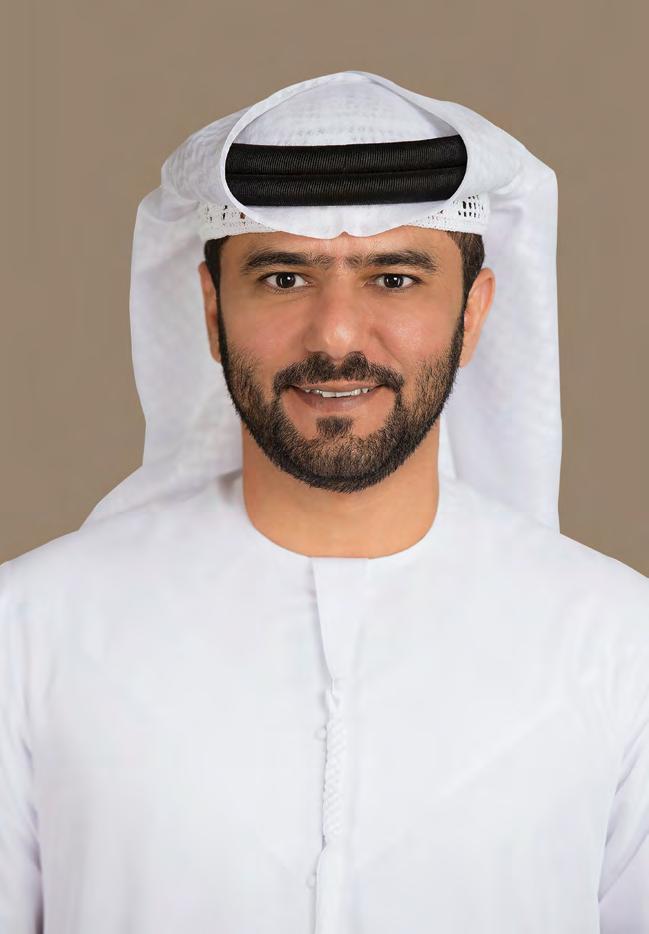
As a founding member of the HOPE Consortium, Abu Dhabi Ports has helped develop one of the most effective and complete end-to-end supply chain solutions capable of delivering millions of COVID-19 vaccines to all parts of the world, from the point of production to the point of vaccination.
Abu Dhabi Ports witnessed how global supply chains are continuing to migrate away from the analogue
UNDER HIS LEADERSHIP, ABU DHABI PORTS BEGAN 2021 WITH A FORWARDLOOKING APPROACH, THE HIGHLIGHT OF THE YEAR THUS FAR IS THE SUCCESSFUL ISSUANCE OF USD1 BILLION, 10-YEAR BOND TO BE JOINTLY LISTED ON THE LONDON STOCK EXCHANGE (LSE) AND ABU DHABI SECURITIES EXCHANGE (ADX). THE ISSUANCE WAS MORE THAN 4.5 TIMES OVERSUBSCRIBED AT ITS PEAK.
model of the past to a more digitised future. In preparation for the post-pandemic phase, the trade and logistics industry can be confident of what lies ahead thanks to digital tools and emerging technologies.

CEO, DHL Express Middle East and North Africa
In his capacity as CEO, Suliman oversees DHL’s operations across 19 markets and leads a strong team of 5,700 employees. He has been with DHL for 42 years and has held the position of CEO for the past nine years.
Previously, Suliman was the country manager for DHL Express Saudi Arabia, where under his leadership, the office consistently achieved stellar performances. He also managed the Bahrain business for eight years and prior to that held various managerial roles across other regional countries including UAE and Cairo.
eCommerce has been a key driver for DHL, and this has resulted in the firm increasing their capacity and enhancing their network to meet the demand.
Suliman tells LNME: “We’ve been investing in adding air capacity to enhance our network and better our capabilities to service high demand destinations with greater speed, reliability and efficiency. We have been upgrading our MENA airplanes and adding more intra-regional and intercontinental routes, connections, and flights to our portfolio to support the growing logistics needs of our clients.”
In April this year, DHL Express MENA began the expansion of its regional aviation fleet with the addition of seven new Boeing 767-300F freighters.
The technologically advanced, energy-efficient jets are based out of DHL’s regional aviation headquarters in Bahrain and have been converted from passenger to freighter configuration by Boeing, to fit the needs of DHL Express and meet the rising demand for express services.
These modern, cost effective and reliable aircraft will improve its air capability to better support the region’s logistical demands while supporting its GoGreen 2050 Mission.

“Based on our performance in 2020, where we saw historic peaks in cross-border eCommerce volumes both globally and in the region, we anticipate this trend to continue, and our enhanced air capacities will enable us to handle the increased demand for delivery expertise in time-definite express shipments.”
Suliman said: “We are excited to introduce our new Boeing 767-300F freighters to the regional DHL Express air network. This investment reiterates our focus on continuously deploying innovative solutions and technologies to meet customer demands.
“Based on our performance in 2020, where we saw historic peaks in cross-border eCommerce volumes both globally and in the region, we anticipate this trend to continue, and our enhanced air capacities will enable us to handle the increased demand for delivery expertise in time-definite express shipments.”
He added: “The new planes will support our objective to maintain a well-connected regional network and optimise our operations whilst simultaneously improving our environmental footprint in line with our zero-emissions strategy.”
Under his able leadership, DHL Express MENA has further enhanced its last mile delivery solutions by enabling customers with more ease, convenience and control over pick-up and drop-off of their eCommerce parcels.
In March, the company signed a partnership with Fodel, the first Pickup and Drop-off (PUDO) network provider in the GCC that, through an advanced PUDO technology platform, signs up and manages local merchants from across the region as alternative pick-up locations to home delivery.
DHL’s customers will benefit from these delivery points by choosing them as pick-up options for their shipments. The partnership with Fodel consolidates last-mile logistics and provides a more convenient delivery solution for DHL MENA’s customers that is faster and more cost-effective.
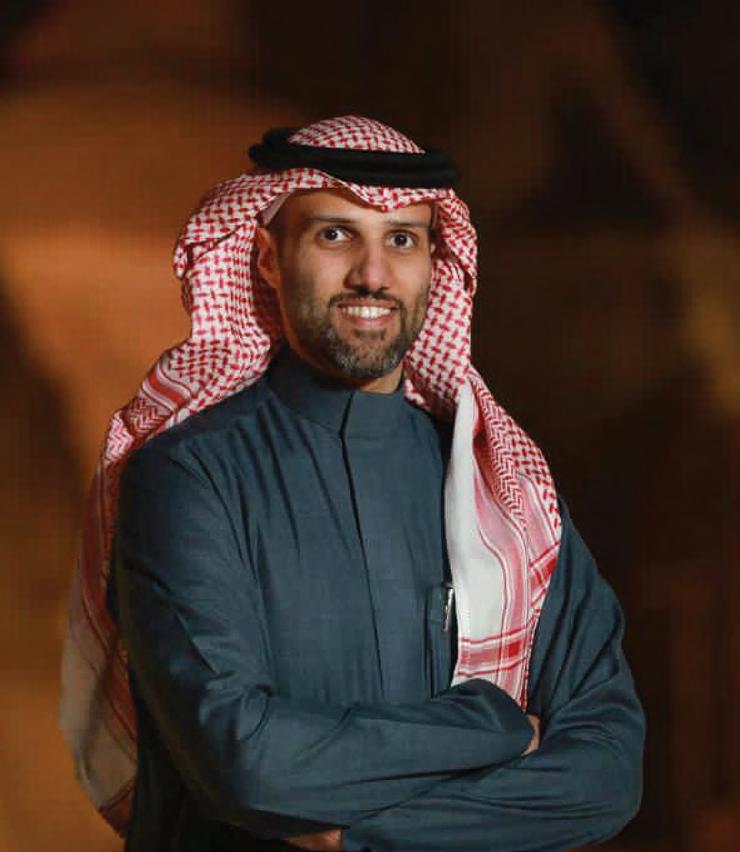
“Capitalising on the growth of eCommerce in the Kingdom, we have added last-mile delivery and fulfillment services to our offerings.”
80% of its process and services are fully automated and integrated with stakeholder platforms.
He adds: “In line with this, we recently enhanced our fleet with advanced telematics solutions that have improved safety and efficiency. This supports our ambitious digital transformation programme, enabling us to build our business through realtime fleet management capabilities and data-driven insights.
“Capitalising on the growth of eCommerce in the Kingdom, we have added last-mile delivery and fulfillment services to our offerings. This milestone cemented our position as the first company in the region to offer complete end-to-end logistics services. Moreover, we have restructured our safety functions across the Kingdom.”
Almajdouie
AlMajdouie has been part of the AlMajdouie Group for eight years.
Since taking charge of the Group, Mohammed has strived to build on the company’s momentum while navigating the complex challenges surrounding the industry.
“I have spent most of my life around the business. Before my current appointment, I served as the Managing Director of Changan in Saudi Arabia and played a key role in developing
the brand within the Kingdom,” Almajdouie tells LNME.
Through advancements in automation and the development of its digital capabilities, Almajdouie Logistics has been able to streamline operations, enhance team members’ skills, and better serve its customers. He also remains focused on developing a company culture that empowers employees and creates a positive and productive workplace environment.
Digitalisation remains an active area of focus and, at present, more than
Saudi Arabia is making huge strides towards achieving its Vision 2030 goals, particularly becoming a global hub for logistics services that connects three continents. Having the right infrastructure in place is vital and Almajdouie Logistics is proud to support this process with its expertise, workforce, and extensive portfolio of assets.
He says: “Our most prized asset is our workforce, which forms the backbone of our organization. Backed by our strong company culture and a focus on safety, our team members function as one family to help customers overcome the most challenging logistical requirements. This is even more vital during these challenging times.”
“Supply chain and logistics operations are on the frontline of the pandemic, keeping essential supplies moving despite significant transport disruptions, movement restrictions, and market volatility. These complications have accelerated the need to innovate, an area in which Almajdouie Logistics excels.”

As the leading operators of Logistics Parks and Economic Zones in Saudi Arabia, LogiPoint started its journey as the first and only bonded and re-export zone in the country. Since then, it has established itself as a platform that enables the logistics and supply chain industry with innovative solutions and pioneering initiatives.
Shaikh has over 20 years of high impact experience in the Middle East’s shipping and logistics industry and
has previously held senior leadership roles within leading global organisations in the UAE, Kuwait, Iraq, Jordan, and Pakistan prior to moving to Saudi.
In 2009, Shaikh joined the SISCO Group’s SAR2 billion Red Sea Gateway Terminal project as part of the core senior management team and played an instrumental role in building, launching, and operating the first privately built state-of-the-art container terminal in the country. Since joining LogiPoint in 2018, Shaikh is committed to transforming
the organisation into a regional logistics hub.
At LogiPoint, Shaikh has been leading the drive to transform the organisation into the region’s foremost supply chain and logistics hub. He has reinforced the LogiPoint mantra of going ‘One Step Further’ in enabling the logistics industry and identifying opportunities for growth and development by working closely with industry stakeholders to anticipate and understand the needs of the market.
This has enabled LogiPoint to design, introduce and implement innovative solutions which create market efficiencies through eliminating waste, reducing cost, and increasing profitability for their clients.
Industry recognition for LogiPoint’s value proposition has come in two ways: in signing of strategic partnership contracts with global blue-chip companies in eCommerce, express delivery, FMCG and 3PL segments; and in the form of various prestigious industry awards as a supply chain and logistics hub.
Shaikh points to this industry recognition as further proof of LogiPoint being fully aligned with the Vision 2030 goal of turning the Kingdom into a leading international logistics hub.
This collaboration was at display as LogiPoint responded to the challenges posed by the pandemic. They remained close to their customers to address their immediate concerns and to deliver on agreed KPIs without compromising the service quality and standards. LogiPoint has registered a robust growth of over 22% in its business in 2021 as compared to same period last year. A key achievement was to attain this growth
As a veteran of the Middle East logistics landscape, Shaikh is upbeat and optimistic about the growth prospects of the Kingdom’s economy in the post pandemic world and believes that LogiPoint will continue to be at the forefront of the region’s logistics and supply chain market.
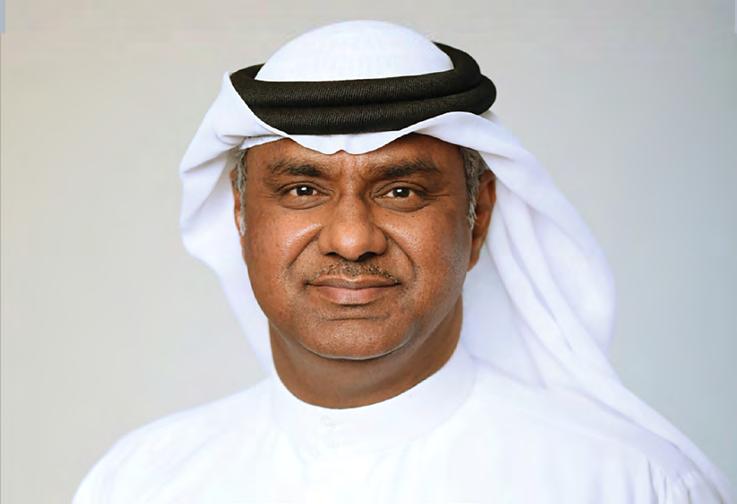
With a career that spans three decades in commercial roles within the Emirates Group, Sultan began his career with the airline in 1990 in the IT department. Two years later he joined Emirates’ management training programme within the Commercial Operations department.
Between 1995 and 2008, Sultan gained extensive commercial experience working in various management and leadership roles both within and outside the UAE. In 2013, he was appointed to his current role taking the division from strength to strength. Under Sultan, SkyCargo has continued to develop innovative, bespoke products. Sultan completed his bachelor’s degree in Computer Science and Management Information Systems from the University of Portland in the US.
In January 2021, SkyCargo joined the Vaccine Logistics Alliance to speed up distribution of COVID-19 vaccines around the world and by the first week of July it had flown 150 million doses of the vaccines through Dubai.
It also signed an agreement with UNICEF in February to prioritise the
transport of COVID-19 vaccines, essential medicines, medical devices, and other critical supplies to help fight the COVID-19 pandemic.
Sultan said: “Every single day counts in the fight against COVID-19 and the sooner that communities can have access to COVID-19 vaccines, the sooner they can curb the spread of the virus and get back on their feet.
“As a global player flying to more than 130 destinations, Emirates SkyCargo has been committed to the fight against the pandemic from the very early stages and we have rolled out several initiatives to expedite the distribution of COVID-19 vaccines through Dubai, starting with our GDP certified dedicated airside hub. Through our partnership with UNICEF, we will be taking yet another step to prioritise and facilitate the rapid and secure movement of COVID-19 vaccines particularly to communities hard hit by the disease.”
The freight division of Emirates has also further strengthened its temperature sensitive pharma and vaccine handling capabilities in Dubai with the extension of its fully automated cool room with 94 airline pallet positions at its EU GDP certified dedicated pharma facility at Dubai airport.
The extended cool room will provide an additional 2600 sqm of temperature-controlled environment (2-25 degrees Celsius) for the storage and handling of vaccines and other pharmaceuticals.
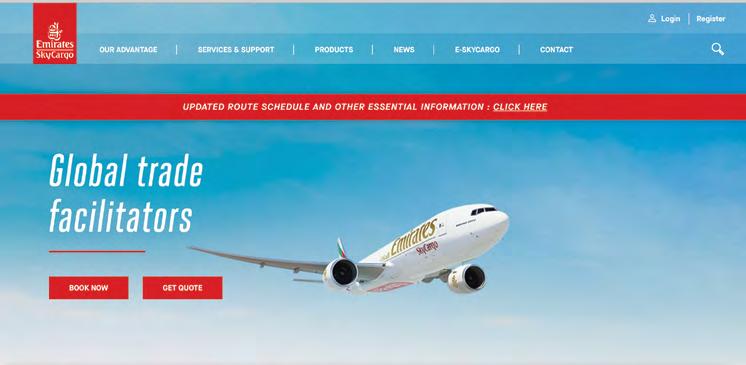

Based in Dubai, Muhs leads more than 11,000 FedEx Express and TNT team members and is responsible for providing the strategic direction for the region.
He joined FedEx in as an intern in 1984 while studying for his business aviation degree. After completing his studies, Muhs became a part-time package handler, and grew within the company,
moving into professional, management, and executive roles across different departments and operating companies.
Prior to his appointment in MEISA, Muhs served as President and CEO of FedEx Trade Networks. He also previously served as senior vice president of US international, global planning, engineering, and trade services for FedEx Express.
Muhs holds a BBA from the University of North Dakota and an MBA from
the University of Memphis. In his current role, Muhs is leading the team in transporting COVID-19 vaccines and medical aid as it is the most important work in the history of the company.
FedEx is delivering vaccines to 35 countries across the globe, and since January 2020, FedEx has delivered more than 13,000 COVID-19-related charitable shipments.
Muhs’ biggest achievement is raising his two boys. “One is a Captain in the US Air Force Intelligence group and the second is a Ramp Manager at FedEx. I’m so proud of them,” he says.
On the professional front, he says, his proudest moments are “seeing my team members grow in their careers. Especially the ones that were part of our biggest successes like our COVID-19 response. My team has grown stronger and has demonstrated to the world who we are and what we do.”
Muhs is also leading the team to introduce Roxo, the FedEx SameDay Bot, an autonomous delivery device, to Dubai. Roxo made its first international appearance outside the US in Dubai. He says: “We’ve recently completed the first phase of digitally mapping Dubai’s sidewalks and gathering data to support its future presence here in the UAE.”
As leader, he believes in delegation where the team complements his capabilities with their strengths. “Putting the needs of team members first, supporting and guiding them to accomplish a vision are the best ways a leader can grow the impact on the business and move the organisation forward faster together,” he notes.
The welfare of his team is his number one priority, he says. “I’ve always prioritised safety of my team and our customers, but when faced with a lifechanging challenge like the pandemic, this was supercharged with daily messages and discussions on how to manage this challenge safely.
“Our business remains strong thanks to our team members, who I believe are heroes without capes, delivering not just pharmaceuticals, but other critical shipments that have kept trade flowing, businesses operating, and our home life functioning,” Muhs adds.
With more than 25 years of professional experience, Engineer
Al Suwaidi has worked with government departments, economic authorities, and local and international entities, and has held leadership positions across various vital sectors.
He took on his current role in May 2020 and has been leading the free zone to new heights. AlSuwaidi started his career in the energy sector at Emirates General Petroleum Corporation and then stepped up to become part of the marketing and operations department at Dolphin Energy. Subsequently, he moved to the invest-
ment and business sector as Executive Director of Energy and Environment Park in TECOM Group, a Dubai Holding company. He also became involved with the green building construction and sustainability sectors at the TECOM Investment Group and became Chairman of the Emirates Green Building Council (EmiratesGBC). Later, he ventured into the maritime industry and served as the Vice President for Commercial, Procurement, and Project Management at Drydocks World and as the General Manager of Dubai Maritime City (DMC).
AlSuwaidi is also part of the technical committee of the Japanese Classification Society (ClassNK) and Emirates Classification Society (Tasneef), and Vice Chairman of the UAE Shipping association.
Al Suwaidi took on his new role at a challenging time with the social and economic disruption caused by the COVID-19 pandemic profoundly affecting the logistics industry altogether. He says: Ajman Free Zone hosts companies from the logistics sector. In response to the challenges of the pandemic, we have modified our policies and developed a strategy in line with the guidelines and improvements set by the UAE legislation to support these companies.
“Amid the pandemic, we helped ensure continuity of business operations, enable rapid adaptation to current conditions, and expedite recovery by providing special incentives and facilities. Specifically, we either reduced or cancelled certain fines and fees and extended financial support, flexible instalment plans, and discounts on registration and labour accommodation.”
He adds: “With these incentives, we were able to help businesses maintain their operations in the emirate and contribute to the continuous growth of the national economy. Moreover, our combined efforts have helped foster confidence and optimism within the business community, in line with the goals of Ajman Vision 2021.”

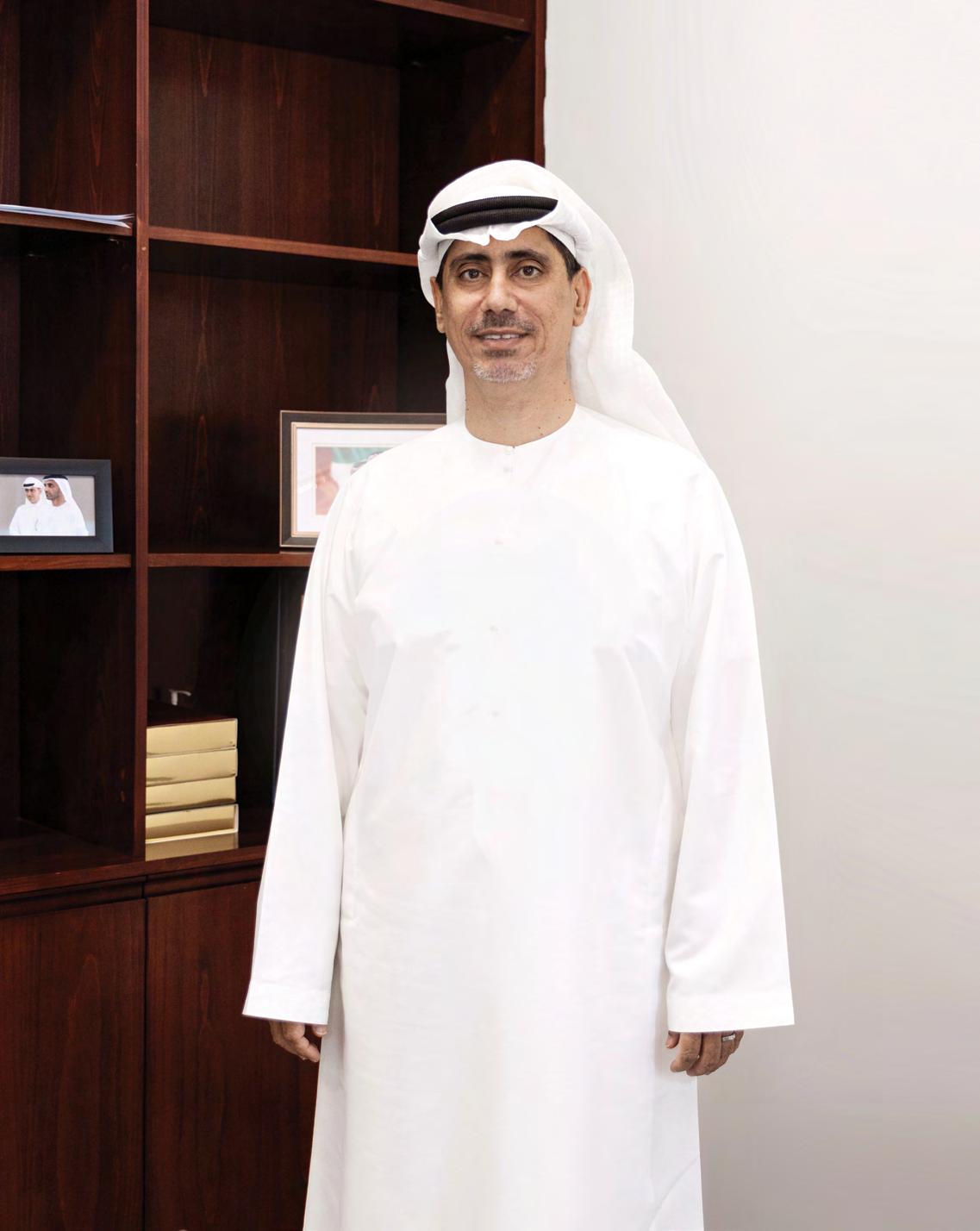
“Ajman Free Zone hosts companies from the logistics sector. In response to the challenges of the pandemic, we have modified our policies and developed a strategy in line with the guidelines and improvements set by the UAE legislation to support these companies.”
Avisionary in the UAE’s business world, Al Masaood is recognised as one of the youngest and most progressive leaders in the country, he is currently spearheading an impressive number of well-established companies, including Al Masaood Oil & Gas, imparting his entrepreneurial perspective, charismatic leadership skills, unmatched vigour, in-depth economic knowledge, and his philosophy of ‘giving back to the community.’
Al Masaood honed his business acumen early in life by observing and working alongside his father. After completing his master’s degree in Business Management from the Royal Holloway University of London, he
became the Vice Chairman for Al Masaood Group, where he steers the company’s operations and champions global best practices in business, including the incorporation of sustainability.
His focus on improving efficiency while reducing costs has helped Al Masaood Oil & Gas deliver exceptional results despite the oil price slump of 2018 in the Middle East, and his vision allowed him to diversify the group’s portfolio by establishing new corporations in multiple industries.
Apart from his business endeavours, Al Masaood supports various causes to enhance safety and interconnectivity in the region. He also created the country’s largest road safety checks initiative, which includes a compre-
hensive maintenance review of all emergency vehicles. Every year, he organises, supervises, and personally participates in these causes.
He is also passionate about sports, and he strongly believes in the power of healthy competition, as well as understanding the valuable role sports plays in positively impacting future generations.
He launched the Juventus Football Academy, and his group sponsored the Emirati athlete Rashid Al-Omari in various international competitions and arranged the Khalifa International Bowling Championship.
He is well-known and respected for his optimism and positive attitude. His views on diversity, women empowerment, private-public partnerships, and the overall economy have been shared in several articles published by the Oxford Business Group and Al-Bayan where they serve as an important resource for business professionals and analysts.
In his personal life, Al Masaood spends time on adventurous ski slopes around the world.
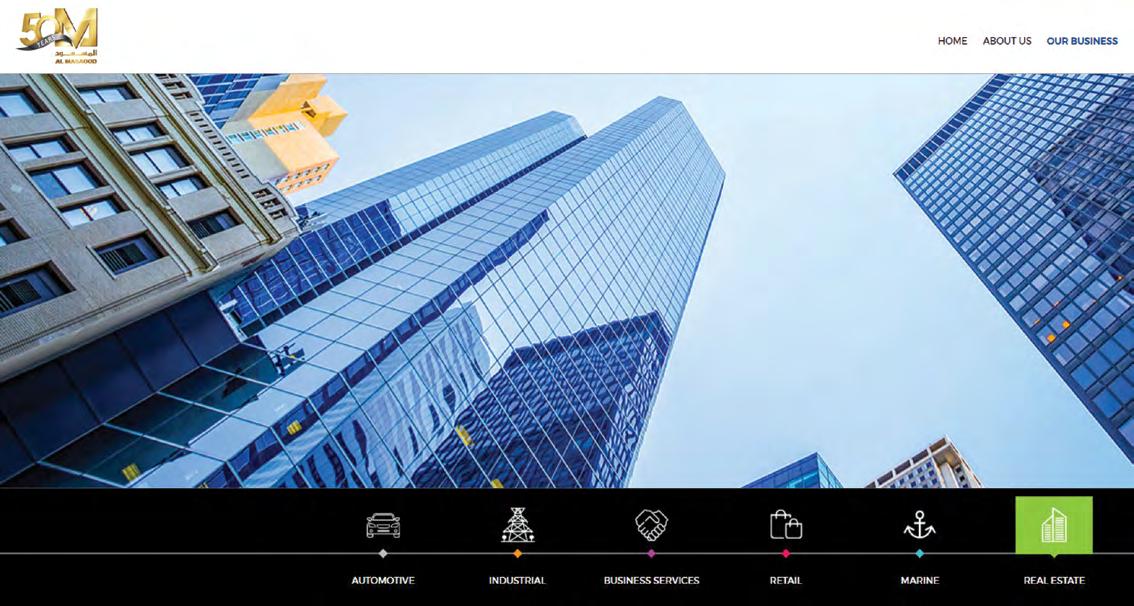
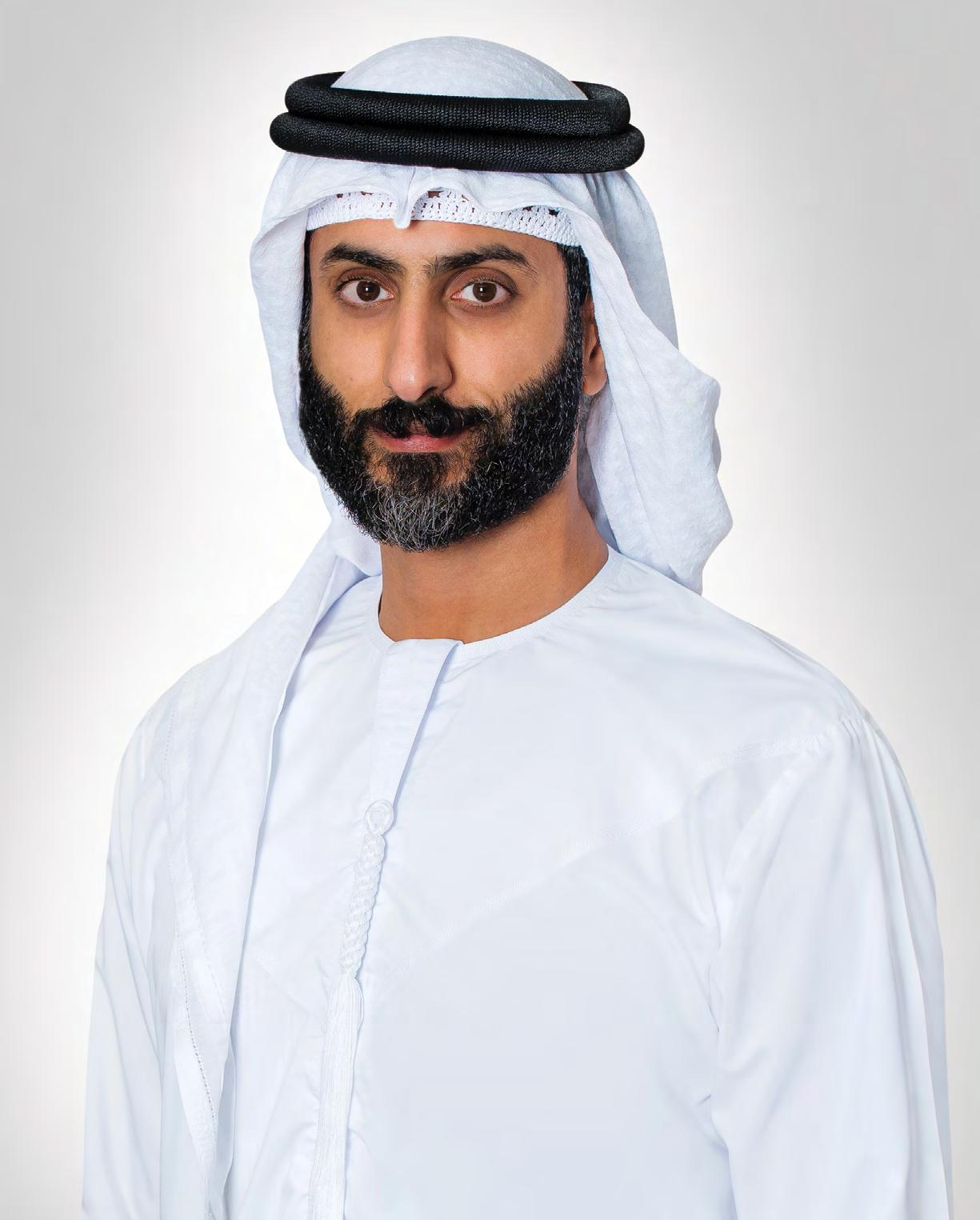
HIS FOCUS ON IMPROVING EFFICIENCY WHILE REDUCING COSTS HAS HELPED AL MASAOOD OIL & GAS DELIVER EXCEPTIONAL RESULTS DESPITE THE OIL PRICE SLUMP OF 2018 IN THE MIDDLE EAST, AND HIS VISION ALLOWED HIM TO DIVERSIFY THE GROUP’S PORTFOLIO BY ESTABLISHING NEW CORPORATIONS IN MULTIPLE INDUSTRIES.

With over 25 years of experience derived from multiple international assignments within the infrastructure and maritime sector, Floe has developed comprehensive expertise in port and terminal operations and management and the successful establishment and leadership of Public-Private Partnerships.
Since assuming the leadership of RSGT in 2018, Floe has overseen the signing of a new 30-year concession
agreement with the Saudi Ports Authority, which calls for the investment of USD1.7 billion in infrastructure, equipment, and technology and the expansion of annual throughput capacity of the facility to nine million TEUs by 2050.
Under the new concession, in 2020, RSGT expanded its existing facility in the northern part of Jeddah Islamic Port, significantly expanding its handling capacity from 2.5 million TEU to 5.2 million TEU, becoming the largest container terminal in Saudi Arabia and the Red Sea.
Since assuming the leadership of RSGT in 2018, Floe has overseen the signing of a new 30-year concession agreement with the Saudi Ports Authority, which calls for the investment of USD1.7 billion in infrastructure, equipment, and technology and the expansion of annual throughput capacity of the facility to nine million TEUs by 2050.
In June, RSGT announced the successful completion of USD280 million equity sale to Public Investment Fund (PIF) & COSCO SHIPPING Ports Limited (CSPL). Each of these two entities has become 20% shareholders in Red Sea Gateway Terminals.
The investment, by both one of the largest and most impactful sovereign wealth funds in the world, and a leading global port operator, demonstrates the strength of the business and confidence that the industry and investment community have in RSGT domestic and international growth strategy and implementation.
Prior to joining RSGT, Floe held the position of Senior Vice President and Regional CEO for ICTSI, the Manila-based global terminal operator. Floe began his career with A.P. MollerMaersk Group, progressing through various senior roles, including CEO of a major container terminal, and responsibilities for business development in the Middle East and Africa, and concession negotiations.
He holds an Executive MBA degree from IMD in Switzerland and has a background in Engineering. He has completed numerous executive university programmes at the University of Pennsylvania’s Wharton School of Business, INSEAD International Business School in Fontainebleau, France, and IMD.

Renault Trucks bringing major improvements in terms of driving comfort, on-board comfort, safety and productivity.
More comfort, More uptime, more safety, more fuel savings We have gone a long way to support you better.
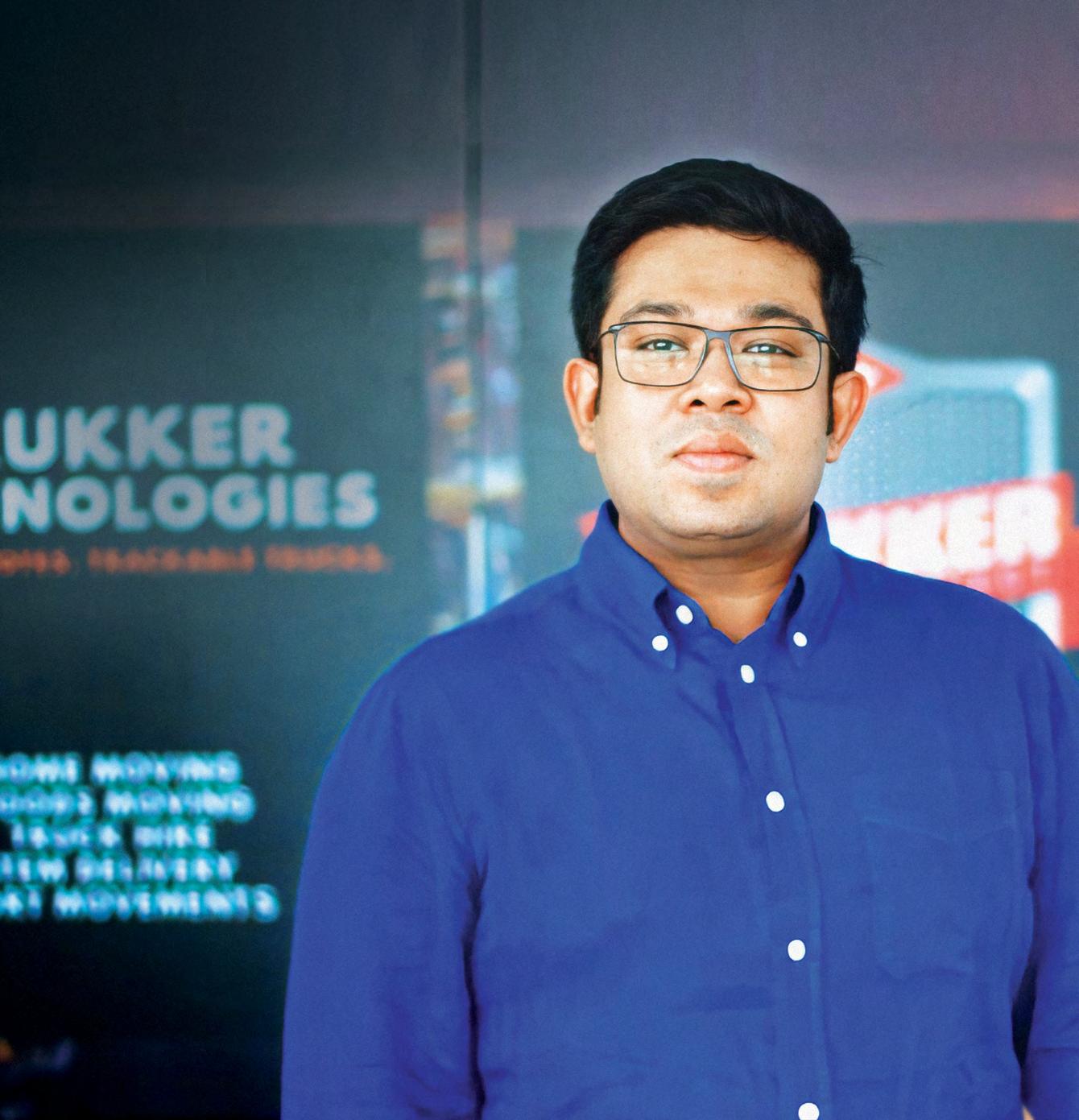
“It is an extremely promising industry where opportunities lie in every challenge that the stakeholders of this traditional and somewhat primitive land freight sector face! We are fast evolving into creating solutions beyond just land freight, with products that will enable the multiple small entrepreneurs that power this sector, by giving them access to privileges only larger organisations enjoy today.”

For Biswas, calculated risks are worth taking if they are in line with the vision of the future. Before founding TruKKer, he spent 12 years with international consulting firms such as AECOM and Arup.
He quickly rose to the peak of his career, becoming one of AECOM’s youngest director, at 32. During his consulting career across the UK, US and the GCC, he has delivered high-profile megaprojects like the Atlantis Hotel in Dubai and the Warner Bros. Theme Park in Abu Dhabi.
It was then when a single lightbulb moment during a dinner with friends had him jump into TruKKer. “What sparked inside me during my conglomerate stints also lit the vision of a highly scalable solution, i.e., TruKKer,” says Biswas. “I was right to evaluate opportunities in an unorganised yet potentially ripe market.”
Under his leadership and guidance, TruKKer has grown to be one of the largest and most advanced digital freight networks in the MENA region. With more than 30,000 trucks in its fleet, today TruKKer helps over 500 enterprise clients bring their global trade across the region seamlessly every day.
“As the CEO, I am responsible for the commercial and operational targets of my company hustling every day and hour. I am a stickler for growth - thanks to my past learnings and business acumen, I can think big and plan big. At 30, I was leading billion-dollar programmes and teams across four countries,” he points out.
TruKKer’s growth has been phenomenal over the years compared to other players in the region.
Biswas adds: “It is an extremely promising industry where opportunities lie in every challenge that the stakeholders of this traditional and somewhat primitive land freight sector face! We are fast evolving into creating solutions beyond just land freight, with products that will enable the multiple small entrepreneurs that power this sector, by giving them access to privileges only larger organisations en-
joy today. Technology enables us to be efficient while managing multiple stakeholders and we constantly add complexity to our engineering to make the process simple for our users.”
He attributes most of TruKKer’s success to technology innovation and smooth on-ground operations, which he claims are responsible for introducing reliability, transparency, and convenience to the monolithic freight world.
“It is important not to lose focus on the ground and always realize, it is an ace team that enables any company’s success, no one person,” he says. “In terms of successful expansion, TruKKer services cargo owners and transporters across UAE, KSA, Egypt, Bahrain, and Pakistan within four years of its formation.
“We are also eyeing a very significant expansion footprint across Africa and the Levant region, where we are exploring countries that are similar to Egypt, for example, Jordan and others.”
At the heart of TruKKer’s business expansion and development sits the technology innovation centre. TruKKer uses a hi-tech technology stack to crystallise the various disparate elements of the highly fragmented freight world through platformisation.
Looking ahead, TruKKer is planning investments in multiple infrastructure programmes that focus on transparency, security, and driver welfare. “It is our duty to not stop at technology innovation only, which is a hygiene factor for us, but to also identify infrastructure gaps that currently affect utilisations and customer experience,” he notes.
“It is an extremely promising industry where opportunities lie in every challenge that the stakeholders of this traditional and somewhat primitive land freight sector face!”
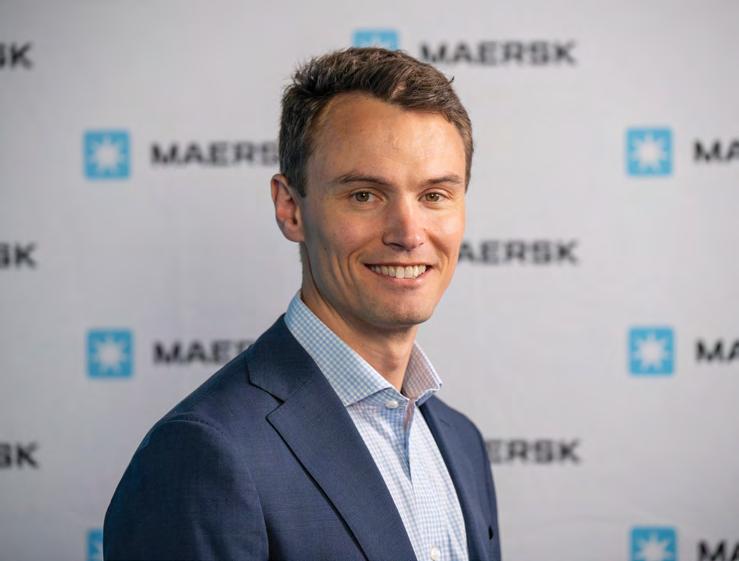
Cook joined Maersk in the UK in 2002 and had the opportunity to grow through commercial roles across the UK, Africa, and Europe and for the last few years in Dubai, UAE.
While his roles have been commercially orientated, Cook has focused a lot on developing a customer-centric approach to all the products and services being offered in the country.
He said, “We are transforming at Maersk - from being a shipping line to an integrated logistics company. We are committed to creating solutions for our customers that will simplify their supply chains. We are increasing backing our solutions with technology and pioneering a change in the logistics sector.
“I have been a great promoter of both
customer-centricity as well as technology and bringing them together to drive the future of logistics will be one of the most important chapters of my career.”
Maersk’s vision to become an integrat-
“I have been a great promoter of both customercentricity as well as technology and bringing them together to drive the future of logistics will be one of the most important chapters of my career.”
ed container logistics company entails transformation of several aspects of its business, including launching several new product offerings for air freight, less than container loads (LCL) and warehousing.
Prior to his current responsibilities, Cook was based in the Netherlands with Damco as the Global owner of the Lifestyle Industry Vertical. He was responsible for the global PNL including strategy development and execution.
Cook holds a Bachelor of Science degree with Honours, in Logistics, from the University of Cardiff in the UK.
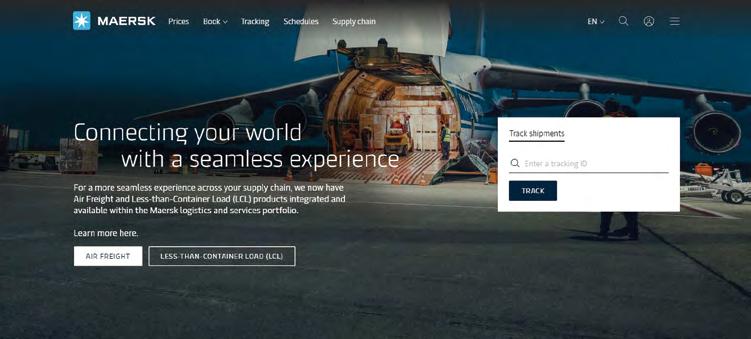


Choosing a gas powered truck will put you and your fleet in the forefront of sustainable truck operations, reduce your CO2 emissions and achieve Euro 6 Emission Legislation without using Adblue or Particulate Matter. Well suited for both urban and regional operations. It can be matched with R, G, L or P cabs and combined with either the Scania Opticruise gearbox or automatic transmissions.
For more information about our Alternative Fuels options, please visit www.scania.com/ae/en/home/products-and-services/articles/alternative-fuels.html
Dalmia entered the competitive logistics market with the inception of Trukkin in 2017 and has worked tirelessly to become a successful founder of the region’s leading techno-logistics platform.
Born out of a zeal to offer unique features and optimised opportunities in a saturated market, his inventive entrepreneurial spirit has further grown the start-up to an established leader in the industry.
Right from its inception, Trukkin’s core focus has remained to seamlessly
unite its world-class cloud-based intelligent operations and services with shippers, brokers, and drivers through an integrated and user-friendly interface. Focus remains on further providing other value-added services which lay the groundwork for increased financial inclusion for the unbanked and bought about much-needed transparency and efficiency for suppliers.
Under his able leadership, Trukkin has recently secured SAR26 million for its Series A funding round. The round was led by Saudi-based Emkan Capital with the participation from Impact46 Seed Fund, Taya Group, and other strategic investors. With this financial acceleration, Dalmia has ambitious plans of making Trukkin the preferred enabler that will bring the fragmented logistics market together on an integrated, world-class platform.

His strategic vision helped the venture grow in revenues despite the challenging business environment in 2020.
Trukkin also established a strong presence in Pakistan during the same time and is now set to tap the enormous growth potential of the logistics industry in the MENA region.
Dalmia’s expertise in harnessing opportunities and strategizing targetoriented development has immensely helped Trukkin become the success story it is today. Whilst being a niche logistics aggregator, Trukkin has expanded into several geographies in just three years.
At Trukkin, honing service offerings is an ongoing process due to Janardan’s constant quest for perfection, competitiveness, and transparency. It is no surprise that the company has been offering instant benefits to its customers when it comes to reducing overheads, optimizing routes, timely payments, and real-time tracking.
Dalmia’s success essentially lies in his penchant for solving complex problems with innovative solutions. Long before he established Trukkin, he had a highimpact career as an investment banker where he was associated with over USD75 billion in M&A and financing assignments for clients globally.
He worked closely with developed and emerging markets for over a decade. This robust experience helped in crafting the nuances of business for Trukkin making it a platform with innovative solutions and pioneering initiatives.
Dalmia has also been leading the company as a CEO and is committed to transforming it into a leading regional logistics enabler. As an industry thought leader, he is a regular at many panels discussion and he has graced the podium as a speaker at the Future IT Summit 2020 and Amwal - PE Forum amongst several others.
“Professionalism and time-sensitivity remains at the core of logistics business. These unprecedented times have made us strong to turn challenges into opportunities. There’s no looking back when the horizons of success beckon and the key is to remain focussed and determined,” he tells LNME.

“Professionalism and time-sensitivity remains at the core of logistics business. These unprecedented times have made us strong to turn challenges into opportunities. There’s no looking back when the horizons of success beckon and the key is to remain focussed and determined.”
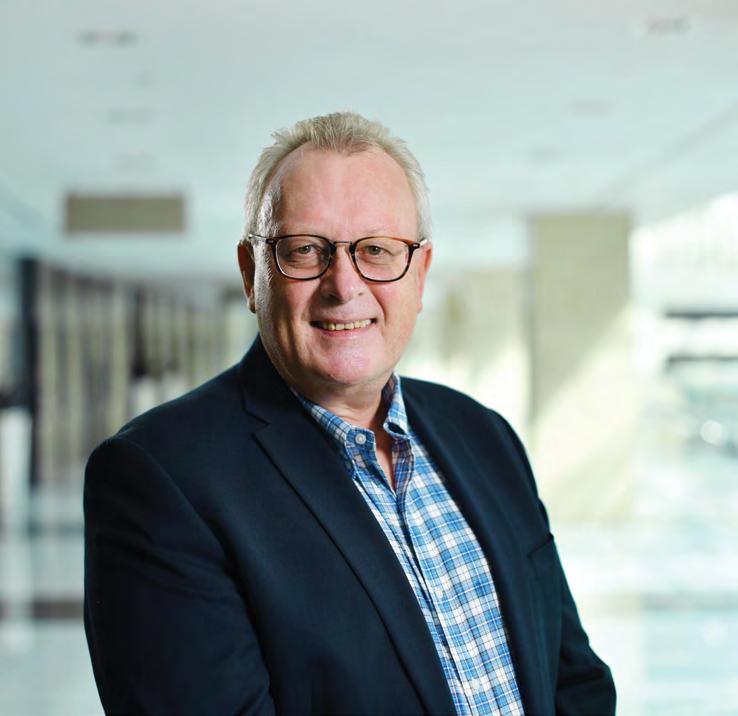
Struck leads dnata’s cargo business in the UAE as well as the airline services unit at Al Maktoum International Airport (DWC) in Dubai South. Before joining the Emirates Group in 2006 his career in aviation covered positions across the globe with Lufthansa, British Caledonian, American, United Airlines and Fraport.
Struck holds his current role since 2014 and is also chairman of Dubai Express/Freightworks, PAL Airport Logistics and Bollore Logistics LLC.
dnata continues to deliver reliable and safe air services to support and create value for airline customers amid COVID-19 challenges.
Although passenger flights were significantly reduced globally, air cargo demand remained stable and dnata quickly adapted its operations and continued to work closely with partners to maintain global trade and the flow of essential goods including PPE, life-saving medical supplies and pharmaceuticals.
In response to the strong air cargo market demand for the rapid, reliable,
Moving forward, dnata will continue to enhance its operations to offer more value to customers. In partnership with Kale Logistics, it will redevelop its cargo community platform, Calogi, to provide one-stop services, including appointment and customs services management, to the air cargo community.
and efficient transportation of essential commodities, several airlines introduced additional cargo capacity by using passenger aircraft with seats fully or partially removed from the cabin. To adapt to changing customer needs, dnata enhanced services, improved processes, and trained employees to handle passenger planes carrying cargo safely and efficiently only.
dnata continued to invest in innovative products, new technology and digitalisation, and rolled out a just-in-time freight handling platform across its Dubai cargo operations. A cloud-based platform, Appointment and Dock Management (ADM) significantly improves operational efficiency and ensures end-to-end transparency of the entire cargo journey.
Moving forward, dnata will continue to enhance its operations to offer more value to customers. In partnership with Kale Logistics, it will redevelop its cargo community platform, Calogi, to provide one-stop services, including appointment and customs services management, to the air cargo community. dnata will also cooperate closely with the Dubai government and local stakeholders to support the 21st-century reincarnation of silk road traffic and optimise sea/air traffic through the emirate by introducing automation and pricing schemes.
Ahmad oversees Dubai South’s Logistics District. Having set up its free zone and established the Dubai Logistics Corridor, which connects Jebel Ali Port with Al Maktoum International Airport via a single, custombonded zone, he leads the overall execution of the district’s operations, manages its financial planning, and is responsible for setting the district’s strategic directions and goals.
Ahmad was also instrumental in laying the groundwork for future developments to ensure the district’s sustainable growth.
Anticipating the rapid growth of eCom-
Smerce and witnessing the growing number of international and regional movers in Dubai, Ahmad was a key figure in launching EZDubai, a purposebuilt zone that supports the growth of the sector through customised business solution and ready infrastructure.
Additionally, as an industry veteran, he played an instrumental role in creating the Dubai eCommerce strategy to consolidate the emirate’s position as a hub for global e-commerce.
Ahmad had set his sights early on a career in supply chain and logistics, earning a bachelor’s degree in logistics and transportation from the University of Tennessee, USA and a Master of

Science in logistics and supply chain management from Cranfield University School of Management, United Kingdom.
ince Ekstrand’s appointment as Group President in January 2013, he has focused on the Group’s strategic plan to ensure GAC is fit for the 21st century’s challenges.
Prior to this current role, Ekstrand was Group Vice President for the Asia Pacific region from 2009, accountable for the GAC companies’ effective and profitable management in the region.
He was also regional director for the Middle East for more than six years. He joined GAC in 1992, working in several stations in the Gulf before taking on his regional responsibilities.
Solid business values paired with adaptability, resilience and innovation
enabled GAC to survive and thrive in 2021 despite the continuing challenges of Covid-19. So, says Ekstrand, who kept the Group on a steady course through the year.
That strategy has been put to the test, not only by the continuing pandemic but also by other spanners in the works of global logistics including the domino effect of the six-day closure of the Suez Canal.
While proud of how GAC has weathered the storms, Ekstrand prefers to focus on the positive developments of 2021.
Work has started on GAC Qatar’s new 27,000m² multi-user contract logistics facility in the Ras Bufontas Free Zone. GAC Sharjah opened a new
office in the Hamriyah Free Zone. GAC Qatar was certified as an Authorised Economic Operator, enabling it to offer faster customs clearance.
Meanwhile, the 2.7 MW solarpowered rooftop at the newly opened Dubai South contract logistics facility generated 5 million kWh of renewable electricity by May.
Losail Circuit Sports Club appointed GAC Qatar as its third-party logistics partner for prestigious international motorsport events, while marine leisure and events specialist GAC Pindar was appointed the official logistics provider for The Ocean Race for an unprecedented third time.
“The past 18 months have demonstrated the flexibility, resilience and innovative spirit of GAC and its people,” says Ekstrand.
“Our long-term approach, looking into the future rather than chasing the quick buck, has served us well, and our willingness to explore or create new solutions to emerging issues is forging our way forward into the future.”
Responsible for the entire Etihad Cargo business, as well as Etihad Secure Logistics, Drew has more than 20 years’ experience in the industry and has been with Etihad for more than 15 years, working across various senior positions.
Drew most recently headed Etihad Airways’ global sales organisation across Europe and Americas, and previously served as Vice President Cargo at Jet Airways, after nine years with Etihad Cargo where he held various senior positions between 2005 and 2014.
Under Drew’s leadership, in January, Etihad Cargo achieved 87% on-time-
performance (OTP) during 2020 –ahead of its 85% target and despite a significant increase in flight utilisation.
The carrier has also tied up with two technology partners to offer integrated booking and digital solutions.
By leveraging WiseTech’s logistics execution platform, CargoWise, Etihad Cargo will seamlessly integrate with the world’s leading logistics providers who rely on CargoWise to carry out end-toend logistics activities.
“Now, more than ever, it is essential for the air cargo industry to accelerate its embrace of digital technologies. Etihad Cargo is carefully selecting partners to enhance customer experiences and
Al-Shawareb has been with Dubai Industrial City (DIC) for 15 years and continues to deliver on the UAE’s vision to put manufacturing at the heart of economic growth and diversification.
Crucially, this includes new strategic agreements to build some of the region’s largest factories and elevate Dubai’s position as an attractive, competitive, and business-friendly global hub for talent, investment, and innovation.
The latest achievement saw Standard Carpets, the UAE’s largest producer and exporter of broadloom carpets, carpet
tiles and artificial grass, break ground on a manufacturing plant. It will become one of the world’s largest carpet factories and the region’s biggest upon completion in 2023.
Al Barakah Dates has also confirmed plans to build the world’s largest privately-owned date factory in the business district. The solar-powered complex will cover 600,000 sq ft and process more than 100,000 tonnes of dates and date products annually.
Al-Shawareb also joined International Holding Company subsidiary Asmak in inaugurating an AED200 million fish factory. It will process more than 40,000 tonnes of seafood per year and

streamline booking processes to provide additional convenience,” Drew said.
Its partnership with CargoAi will elevate its API accessibility for freight forwarders as part of its digitalisation strategy. From August, all aspects of the company’s offer of capacity - including rates, schedules, quotations, and bookings – have been made available via the platform.
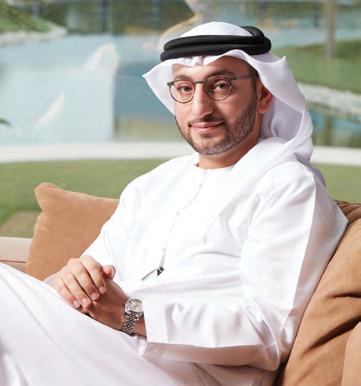
supply companies such as Carrefour, Lulu Hypermarket and Kibsons.
Al-Shawareb also signed a strategic agreement with Sokovo this year to launch a state-of-the-art vertical farm that will grow ‘Made in UAE’ fresh kale, spinach, lettuce, tomatoes, strawberries and melons, supplying hundreds of hypermarkets, hotels and chefs nationwide.
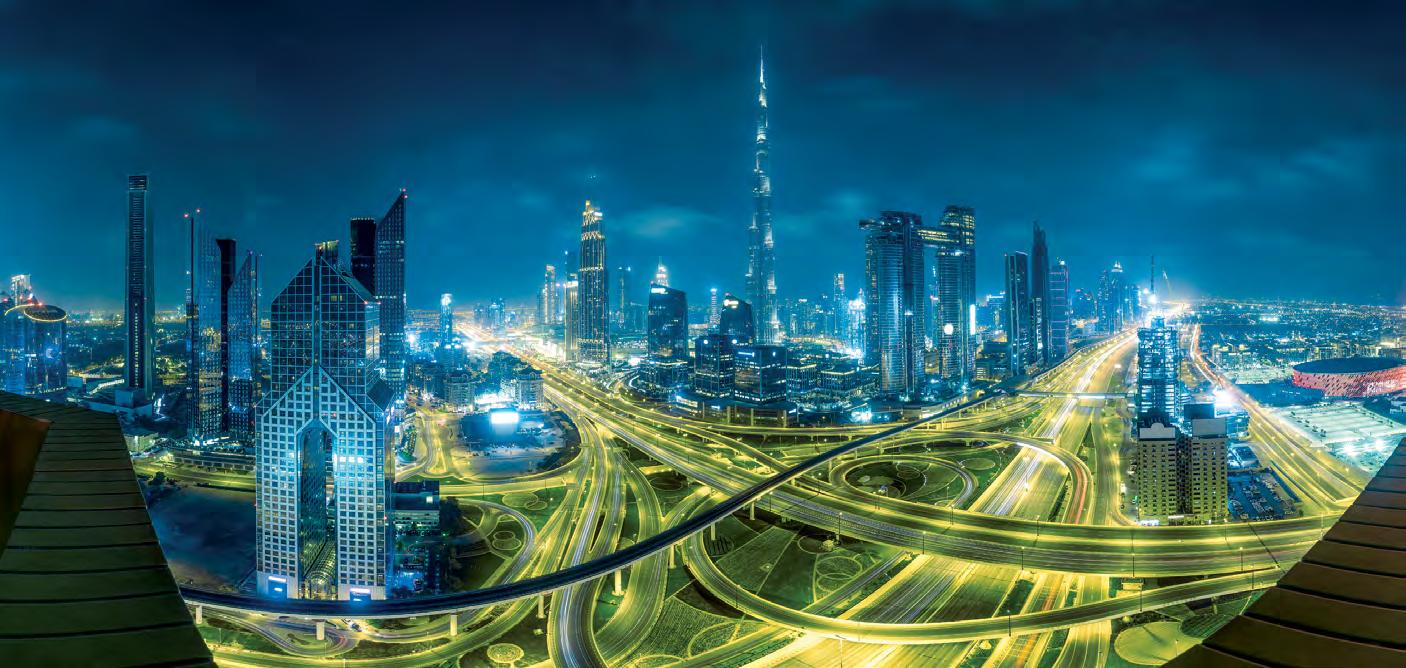



















Founder & CEO, Premier Logistics
Leveraging his degree in Business Management with specialisation in Entrepreneurship and Marketing from Indiana University, Bloomington, US, Khushalani accumulated over 15 years of global experience in spearheading
Fero aims to spearhead a new generation of technological transformation by shaping the future of digital freight with the use of revolutionary automation systems such as narrow artificial intelligence, machine learning, speech recognition, computer vision & blockchain to eliminate the need for human interaction in the logistics industry worldwide. With Neubauer at the helm, Fero has created the
PAULA BELLAMY
Bellamy and Oceanwide Logistics USA set up Oceanwide Logistics (OL) Dubai in August 2016 to offer domestic and international freight solutions in the region.
“The challenge to set up from zero was an enjoyable journey, I learnt a lot about myself and other nationalities along the way, I thoroughly believe this experience helped shaped me into a much better businesswoman with an entrepreneurial vision I didn’t have before I arrived in the UAE,” she says.
ATS is a fully integrated logistics company with ISO 9001 and ISO 14001 standards, specialising in road, air, and sea freight as well as warehouse distribution, liquid terminals, road transportation and onsite logistics. With headquarters in Dubai, ATS operates in India, Oman, Bahrain, Belgium, and the US. Malhotra’s role in ATS has
businesses of FMCG distribution in Africa and real estate development in UAE & India managing multimillion-dollar P&L’s, before venturing into logistics in UAE.
An avid believer of innovation and digital disruption, he founded Premier Logistics in 2016 to focus primarily on digitisation of the age-old industry of logistics within the Middle East. Under his leadership, Premier Logistics has grown from a three-member team to a 55-member team of logisticians.
world’s first AI voice agent that will replace monotonous human interaction and optimise transactions in the freight and logistics. With over 14 years of experience in the logistics industry, she leads a 45+ talent team, with over 30 tech wizzes, that builds, designs, and sells SaaS solutions.
Neubauer has previously worked at various blue-chip companies such as Uber and A.P.Moller-Maersk. “As Head of Business Development - Strategic Initiatives at Uber Technologies, I directed business development operations across the Middle East and African region, with gross bookings of USD2 bn annually. I also handled the first global delivery deal between Amazon and Uber,” she notes.
In 2020, due to the pandemic, Bellamy chose to re-locate back to the UK and in March 2021, she began working on strengthening OL’s presence in the UK & Europe by opening OL United Kingdom. She continues to be the remote Managing Director for the UAE.
She says: “COVID has been and continues to be a major challenge for the logistics industry, along with lack of space, equipment imbalance and rising rates. Cargo owners now have different countries on their radar, different routings and sometimes sourcing more locally to try to continue with their own business but everywhere prices have increased therefore it is the job of a freight forwarder to try to remain at the forefront of knowledge, latest news and different options for us to offer clients with their movements of cargo.”
seen him being recognised by multiple customers as a handson solutions expert to their logistical requirements, various certificates, and awards by multiple customers. Vinit says: “We take pride in the fact that we have started our journey towards sustainable fleet - we are one of the first companies in the region to have recently launched fully battery operated 1.5 tonne delivery trucks. Our warehouses have started their green initiative as well where we have limited the use of paper and digitised most activities. Additionally, we are also installing solar panels in our warehouses which will be a step in the right direction.”
Vice President Contract Logistics/ SCM and Distribution, DB Schenker Middle East and Africa
In his current capacity Djaf oversees all DB Schenker contract logistics and distribution activities across the Middle East and Africa and is responsible for setting its strategic directions and goals. Since taking charge of Middle East and Africa back in 2013, Djaf has established new steps in several countries across the region and developed the DB
BKGroup Managing Partner, ALS Logistic Solutions Group
houry has an MSc in Engineering from St Petersburg State University, Russia and over 20 years of experience in the logistics and aviation industries, including project management and equipment fabrication, airport systems and design consultancy for automation projects.
Founder and Chief Executive Officer, iMile 22 23 25 24
ellamy and Oceanwide Logistics USA set up Oceanwide Logistics (OL) Dubai in August 2016 to offer domestic and international freight solutions in the region.
“The challenge to set up from zero was an enjoyable journey, I learnt a lot about myself and other nationalities along the way, I thoroughly believe this experience helped shaped me into a much better businesswoman with an entrepreneurial vision I didn’t have before I arrived in the UAE,” she
Managing Director of Savoye in Europe, Middle East, and Africa
Zielinski leads the overall growth and presence of Savoye in Europe, Middle East, and Africa as its Managing Director. He is also in charge of key solutions such as advanced software for the supply chain and advanced tech-
Schenker footprint by more than 350,000 sqm. Under Djaf the region has established its first and second mega green logistics centre in Dubai with 100% solar power supply and many other features of renewable energy - first in its kind within DB Schenker, globally - and has a third facility currently under construction which will be ready in 2022.
Djaf said to LNME: “With our ambition to be the regional leading logistics service provider in MEA, both in terms of innovation and sustainability, we will focus strongly within our new mega logistics centres on the topics of sustainability and technology, to be used in the right way making our service offering beneficial and attractive while also being environmentally conscious.”
He was appointed as the general manager in 2001 and is currently managing all major business in the ALS network from its Dubai operation with upgraded offices to accommodate the growing number of staff, as well as other offices in Germany, Malaysia, and Singapore. ALS continues to grow under Khoury’s leadership with many logistics automation projects in the ME & Asia and European regions, bringing ALS again into the front side of companies that are committed to this industry and are very well established as automation solution providers for airports, logistics and car parking solutions.
says. She was awarded the Woman Professional in Transport & Logistics in 2019 award. In 2020, due to the pandemic, Bellamy chose to re-locate back to the UK and in March 2021, she began working on strengthening OL’s presence in the UK & Europe by opening OL United Kingdom.
She says: “COVID has been and continues to be a major challenge for the logistics industry, along with lack of space, equipment imbalance and rising rates. Cargo owners now have different countries on their radar, different routings and sometimes sourcing more locally to try to continue with their own business but everywhere prices have increased therefore it is the job of a freight forwarder to try to remain at the forefront of knowledge, latest news and different options for us to offer clients with their movements of cargo.”
nologies for warehouse automation. Prior to joining Savoye in 2018, Zielinski had an extensive experience in intra-logistics and software solutions. He started his career in 2004 at Swisslog as a sales engineer. He rose through the ranks as a business unit and development manager of Swisslog Middle East for 15 years.
Zielinski obtained an MBA in Management from the Swiss Business School of Zürich in 2012, and an engineering diploma from South Alsace Engineering School (ENSISA) in France.

For many years now, DHL has invested in defining and communicating our ‘purpose’ as a company. Some 10 years ago we coined our own mantra: Connecting people, Improving lives. It’s simple, its upbeat, but most of all it underscores our collective belief that logistics and global trade improve
the prosperity of nations and improve the lives of blue-collar workers in those countries.
They say, “No plan survives contact with the enemy”. Our plan and our purpose met a formidable challenge with the arrival of the pandemic. On paper, we faced a serious threat to our business and our ability to serve our customers.
Global supply chains were interrupted, in many countries air traffic came to standstill; border controls sprung up around the world; lockdowns confined people to their homes. No one knew what was around each corner.
I have often gone by the principle that a quick decision is often a bad decision and not to be pressured by fictional deadlines. This situation was different and from talking and thinking as a team it quickly became clear that it was necessary to change work routines and processes almost overnight.
Communication became critical and we had to tailor and translate messages to our employees in 220 countries and territories. We had to ensure protection from the virus and deal with the prospect of downsizing. We resolved to introduce a radically changed environment.
Somehow, we squeezed four years of technological advancement into four months. Previously departments such as HR and IT had often been known as ‘support’ functions. We had to move 9,000 laptops into homes as employees made the transition to their new place of work. Under these circumstances, it confirmed my suspicion that there is no such thing as support functions: we’re all on the frontline and we never missed a moment when we weren’t fully connected to our customers. In fact, more connected than ever before.
At one moment we were delivering PPE to China from the world and then within a matter of weeks the direction shifted, and it was to move PPE from China to the world. We helped to safeguard the existence of brands that had to suddenly close their physical stores and move their business online.
How tough would life have been if people had stopped receiving packages? There would have been no DIY, no gardening, no books, no sports gear, not to mention vaccines, medical supplies, or spare parts for vehicles.
Within weeks, it became apparent that our business remained very strong, and our customers needed us more than ever. We found we were able to fulfil those needs, because our employees were willing
to adapt in a crisis. Connecting people, improving lives - never had this been more relevant than during the pandemic: never before has it been more recognised internally and externally. This simple, memorable idea, cut through and it became a much more known and widely used part of our own lexicon.
Our strategy was able to evolve with the changing circumstances as we’d come up with a way to think about the company and a way to talk about the company that our teams could apply to make their own decisions. During the darkest days, our investment in communicating and clarifying our purpose over many years, paid off. Thankfully, we were not an executive board of ten advocating what to do, we had 110,000 advocates for what we needed to do. Our purpose gave us the momentum we needed to adapt. The concept of ‘influence a thousand’ came to mind.
The pandemic proved our resilience. We operate in 220 countries and territories. With operations on a global scale, natural or political disruption of some kind will be going on somewhere every week. We’ve got to deal with it. As a company, we must be optimistic about a swift recovery from the pandemic – in the same way as we got through the Icelandic ash cloud of 2010 and the great Recession of 2008. In the same way this would pass.
Like so many other front line and essential services, we helped secure livelihoods, we delivered health and joy, we enabled growth and kept supply chains running. It wasn’t difficult for our employees to see the impact they were having. For our people, this was a source of tremendous pride and meaning. This was reflected in our annual Employee Opinion Survey, conducted among all employees. It shows that employee engagement jumped from 77% in 2019 to 82% in 2020.
The benefits of maintaining global connections have become even more tangible than before. Vaccine development itself is a great example of globalisation at its best. It wouldn’t have been possible without the global division of labour and the global exchange of knowledge.
Now that vaccine production is ramping up, the distribution of vaccines depends
crucially on global logistics. To date we have distributed more than 200 million Covid-19 vaccine doses to 120 countries. This is an excellent example of our purpose (and globalisation) in action.
The distribution of vaccines is not just essential for our customers and the world. It’s also motivating for our employees: they feel part of something, their families show their pride in the, and they are thrilled when they see our planes arrive and the distribution process start.
But our purpose is not just a feature of work life. We want our employees to be active citizens in helping the towns, villages, and communities where they live. Our ‘Go’ programmes support the efforts of our employees to contribute to wider society.
Whether it’s to make it easier to trade across borders, (GoTrade), giving young people the opportunity to learn new skills (GoTeach), preparing for the logistical challenges of natural disasters (GoHelp) or to ensure business success is compatible with environmental protection (GoGreen), we have initiatives to get employees involved in causes that drive them.
Also, we’ve launched DHL’s Got Heart –a way that colleagues can draw attention to the charities they support or set up ways to back good causes through their own initiative.
International collaboration can counter the forces of nationalism and protectionism which threaten the flow of trade. Alibaba’s Jack Ma puts it succinctly, ‘If trade stops, war starts’. Corporate work
cultures can offer a model for societies, showing how commerce can transcend religious and cultural differences and be inclusive or many nationalities and languages.
We know that trade can soothe the tensions between nations and create bonds of fellowship. If companies like ours succeed in engaging and empowering our employees, that will provide a template for governments and wider society.
Sometimes it’s hard to find the words to say what we mean when we talk about purpose. But I found you don’t always need to. Remember the song Bridge Over Trouble Water by Simon and Garfunkel?
During the pandemic, we used this song and the lyrics to complement some of our communications. It was memorable. It caught the mood. And it conveyed a message. It said everything we needed to say about how we needed to maximise our collective effort to overcome setbacks during those difficult days. We’re proud that we did what we could to calm troubled waters.
Last thoughts: The purpose of any company and organisation should be aligned with what it is they do, where they operate, what industry they are in, what assets they have and where their employees live. What matters is how you ‘connect’ locally and at the end of the day your own example is the best example and your employees will be proud and justifiably so as it is them that carry the torch.


LYVE’S NEW CROSS BORDER DELIVERY SERVICE IS GAINING STEAM IN THE UAE’S ECOMMERCE SECTOR AS IT ALLOWS SMALLER BUSINESSES TO DELIVER THEIR PRODUCTS TO CUSTOMERS IN SAUDI ARABIA SEAMLESSLY
Dubai-based logistics solutions and technology provider Lyve recently launched a cross border delivery service from UAE to Saudi Arabia, its first, enabling eCommerce businesses to deliver goods between the two countries.
Ian Caron, Senior Director - Non-Food Logistics, Lyve, explains why this solution was introduced: “The growing demand from our existing and new client base requesting us to support their deliveries for this lane has been one of the main contributing factors in extending delivery solutions to Saudi from the UAE.
“Simply listening to the recurring painpoints encountered by most companies with this specific delivery lane has driven us to work out a simple yet seamless door-to-door solution, focused on mitigating any customs and other potential transit delays. It’s a simple four step process from collection, documentation, transit clearance and delivery to end consumer which is handled 100% on behalf of our client.”
He adds: “The confidence which our clients have expressed commitment, and the services they have come to expect
from our eCommerce team is proving that reliable services at reasonable prices are a winning formula. This retains and expands the work collaboration with our clients into other markets.”
Tapping into new markets
Cross border services have steadily become of vital importance to the eCommerce sector as it offers multiple benefits. Expanding customer base and tapping into new markets can increase sales while helping businesses learn about the demand in different markets – potentially leading to creating new products and growing the business.
“Cross border delivery can also save on inventory cost and increase profits by ensuring that products no longer sit in warehouses for long periods of time,” Ian notes.
Since its launch, the service has been quite well by the market, leading Lyve to expand this service throughout the region soon. Ian reveals: “We plan on establishing delivery solutions across the rest of the GCC countries first before tackling the MENA region, and ultimately going global – in parallel with our current office expansion worldwide.”
For now, Lyve’s focus is to be the most convenient process available in the market for smaller eCommerce businesses in Saudi Arabia. What makes Lyve’s cross border delivery solution stand out is its competitive rates and flexible payment methods, no minimum order commitment and easy bookings, hassle-free documentations and reduced customs delay, and daily schedules and speedy deliveries.
Ian adds: “Lyve combines extremely competitive rates on the market with prepaid or cash on delivery options, encouraging SMEs to tackle the Saudi market. We’ve also ensured that no minimum orders are required for shipping – making it easier for small businesses to commit to customers in Saudi.”
This solution allows Lyve’s eCommerce clients to move goods to Saudi every day, having them delivered to customers within three to six working days.
Lyve’s drive comes from the region’s burgeoning eCommerce that has thrived during the pandemic, with lockdowns becoming a catalyst for a new purchasing behaviour, with more customers turning to online shopping.
Ian says: “A whopping 80% of young Arabs shopped online frequently in 2020, compared to 71% in 2019. eCommerce sales in the MENA region are expected to reach USD48.6 billion in 2022 and the UAE, Saudi and Egypt currently account for more than 80% of the region’s overall eCommerce market.
“As for cross border eCommerce, 66% of online shoppers in the Middle East placed purchases outside of the region. Fashion and beauty alone are roughly a USD5 billion market in the GCC and happen to be one of the region’s fastest growing eCommerce categories. Along with electronics, home products and groceries, they make up 98% of the UAE and Saudi’s eCommerce.”
The company has big plans to capitalise on this and has tied up eCommerce, courier, pharmaceutical, telecommunication and banking firms in the region. Ian reveals: “Our growing synergy with major brands is proof that although business is already thriving, we’re simply scratching the surface in our non-food logistics endeavours domestically, regionally and on a global scale.”







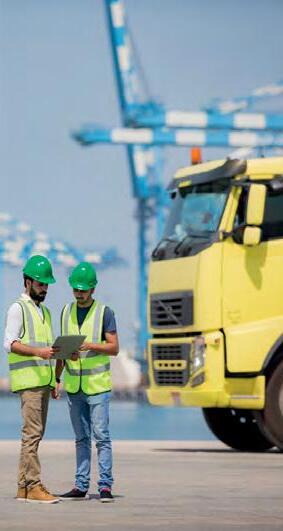












efficient, reliable & modern fleet
This is a first-of-its-kind Cargo SUV model which is now available across Al Masaood Automobile , Renault showrooms in Abu Dhabi & Al Ain.




